- Home
- Ann M. Martin
Mary Anne's Revenge Page 2
Mary Anne's Revenge Read online
Page 2
He wasn’t as bad as he’d been when I was a little girl, but he was definitely getting on my nerves. And that made me feel bad, because I could understand why he was being so protective. After all, he’d lost everything but his family in the fire too.
Why did it have to be our house? My thoughts slipped back into the same old pattern. Why couldn’t it have been the house of someone deeply mean and petty, like Cokie? Of course I didn’t wish that Cokie’s house had burned down, but maybe I did wish she’d had major smoke damage to all her clothes.
And then it came to me. The perfect comeback to Cokie’s shot at the yearbook staff meeting that afternoon: “No, Cokie. I’m just upset because we’ll have to have a page for you for Least Likely Ever to Be Part of a Couple.”
I smiled, feeling better. I rehearsed it in my head, imagining her face if I’d actually had the nerve to say something that spiteful and mean. My smile widened.
“I thought you’d like my new surprise,” my father said.
I returned to the conversation at the table. “Surprise?” I said.
“The new beds I bought. Yours has an antique pine headboard and footboard, carved with a leaf-and-vine-pattern trim. It’ll be great in the new house.”
“Oh,” I said blankly.
“And we can get rid of this lumpy, plastic-wood rental bedroom furniture,” said Sharon. “Super, Richard!”
My father beamed.
I said, “But Dad — I mean, the bed sounds great, but what if I wanted to pick out my own bed?”
My dad looked startled, a little less beamingly happy. “Of course. You can do that. We’ll go by the store tomorrow and cancel the order and you can pick out whatever you want. There’s no rush.”
“No,” I said. “Never mind.”
“Really, Mary Anne …” he began.
“It’s fine.” I shrugged. “It’s just a bed. Whatever.”
We were all silent. I could tell I’d surprised both Sharon and my father. I wasn’t a “whatever” kind of girl.
But maybe it was time I became one. Maybe it was time I stopped taking everything so seriously, worrying about everything being right. Maybe I should start taking things easy. Isn’t that what Kristy had been trying to say to me?
Whatever.
One thing about being the incredible shrinking Mary Anne — it’s easy to be a spy. I spent all of the next day being an attitude-makeover spy at SMS.
That is, I kept quiet and observed my friends and fellow students at school. It was as if I were researching the kind of new attitude I wanted. Maybe you could even call it comparison shopping.
Since Cokie had already made an announcement about the vote over the loudspeaker during homeroom the next morning, I had even more of an opportunity for research. The moment after the loudspeaker squawked and died, everyone began to talk about who would or should win the votes. I heard Alan Gray discussed as a candidate for Funniest (I was sure Kristy would disagree). I heard Emily Bernstein, editor of the SMS school newspaper, spoken of as a sure thing for Most Intelligent. I also heard both Logan and Abby mentioned in the Most Athletic categories.
It was kind of funny, in a way, since the categories themselves hadn’t been decided on yet. We were supposed to do that at a meeting of the yearbook staff that afternoon.
I heard the “who’s who” buzz all day long. Even Kristy, Claudia, and Stacey were caught up in it. Stacey suggested that Claudia should be the only possible choice for Most Artistic. Claudia thought Stacey ought to be elected Most Intelligent and Most Beautiful. Kristy nominated herself (to me) as Most Likely to Be President of the World.
No one suggested I would be the most or best anything. I was just Mary Anne. I wasn’t a sophisticated math whiz like Stacey. I wasn’t artistic and free-spirited like Claudia. I wasn’t athletic and outspoken like Abby. I wasn’t presidential material, like Kristy. But maybe I could work on becoming more … well, something.
By the time I arrived at the yearbook meeting, I was so overwhelmed by how not Most and Best I was, and so amazed at how much thought and energy everybody was putting into the idea (especially the “traditional” categories) that I could only think about what an enormous job this was going to turn out to be. Then I heard Alan Gray talking about how lucky he was to be “naturally funny.” He was campaigning! Grace Blume, Cokie’s best friend and second-in-command, told everyone that in her opinion, people with “classic bone structure” such as Cokie would be the best choice to represent the class as Most Beautiful. It didn’t take me long to figure out that Cokie herself was campaigning — through her loyal-but-not-too-bright friend.
And, of course, thinking about the work ahead, I saved a few other sour thoughts for Cokie, who had not only announced the election that morning but had told the school that the ballots would be handed out on Monday. That meant that Abby, Austin, and I would have to spend the weekend getting ballots, ballot boxes, and ballot collectors organized.
I came into the yearbook office to find that Cokie was still campaigning: “ … a category like Most Likely to Become a Major Movie Star would make a nice new edition to the list,” she was saying as I slid into a seat beside Abby. Then she tossed her head and added, “Being a photogenic and talented person helps, naturally.”
Translation? Choose me! Choose me! Choose me!
Woody raised his hand and said evenly, “I think you’re right, Cokie. I think we need to decide on the categories, both traditional and new. The sooner we do that, the sooner the features staff can get to work on the ballots.”
Cokie looked smug and pleased, even though Woody hadn’t actually agreed with what she was saying. In addition to being a very good-looking guy, Woody was a much smoother operator than I had realized.
The debate that followed was a long one. We agreed pretty quickly on the usual choices: Most Beautiful, Most Likely to Succeed, Most Intelligent, Best Athlete, Best Artist, Funniest, Best Couple, and so forth. Abby didn’t succeed in convincing the staff that the title Most Beautiful should apply to both the boy and the girl chosen in that category. In the end we called it, as always, Most Beautiful and Most Handsome. Mariah, however, persuaded us to change Funniest to Wittiest. Since no one could ever mistake Alan Gray’s gross-out antics for wit, I wondered if she had him in mind when she suggested the change.
The new categories caused a little more controversy. Cokie suggested several extremely mean ones, such as Most Likely to Go Directly to Jail Without Passing Go, and Most Likely to Be Chosen for a Complete Makeover.
But even Rick wouldn’t go along with those.
Cokie looked irritated. “I was just trying to be funny,” she said.
Cokie’s idea of funny is, obviously, putting down someone else.
We did make a category for Most Likely to Be Elected President. Cokie and several of the others threw their votes to Most Fashionable, which we then changed to Class Style Setters.
Other categories included Most Likely to Travel to the Moon, Most Likely to be Seen in Dark Glasses in Beverly Hills, and Most Likely to Make a Million.
When we’d finally finished, Abby went to the computer and we got to work creating ballots.
“This isn’t going to be so bad,” Abby assured me.
“Yeah,” I said. “But I still don’t think people should campaign. It should be —”
I never got to finish what I was saying. Cokie had overheard me, and she went into attack mode.
“Oh, Mary Anne,” she said loudly. “Did we forget to put in a category that you might win? Let’s see. What about Quietest Student … or Most Likely to Completely Disappear into the Background?”
As usual, Cokie’s attempts at wit drew laughter.
Abby’s hand froze on the mouse.
I felt my face flushing.
Cokie went on, “Or how about Least Likely to Keep a Good Boyfriend?”
“But Cokie,” Abby shot back, “we already have Most Likely to Drive a Boyfriend Insane, for you.”
The even-louder laughter tha
t followed stopped Cokie long enough for me to take a deep breath, feel grateful for Abby’s support, and try to think of a comeback myself. But before I could think of anything, Logan walked into the yearbook office.
Several other people laughed at this.
Abby bumped my elbow with her shoulder as if to say, Don’t worry. I’ve got it covered.
Logan didn’t even look in my direction. That hurt. We hadn’t spoken much since the breakup, and I’m not sure what I expected. I couldn’t help remembering, though, how not so long ago, I was the first person Logan looked for whenever he walked into a room.
Now he made me feel invisible. Again.
“Hi, Rick,” Logan said. “I brought these photos by for the yearbook.”
“Thanks,” Rick said, taking an envelope from him and opening it.
“There are two editors of the yearbook, you know,” Cokie said, putting her hand on Logan’s arm. Logan glanced at her, then at her hand. “Hi, Cokie,” he said. “I know.”
“These look good,” Rick said.
I wanted to see the photos, but I remained rooted to the spot.
“Good? They’re excellent,” Cokie gushed. She used her other hand to run one pink-polished fingernail down the edge of the photograph. “You’ve got such an eye, Logan.”
“You think so? Thanks.”
“We’ll have to find some more work for you. The yearbook needs your kind of creativity.” Cokie smiled at Logan. “I’m about to leave. Maybe you could walk me to my locker and we could talk about it.”
“No problem,” said Logan. “I have to go to my locker too.”
Cokie shot me a triumphant glance from under her lowered eyelashes. Then she and Logan left.
He still hadn’t looked in my direction.
“I’d like to use her head for a soccer ball and practice penalty shots against a wall,” said Abby.
“Logan didn’t seem to mind,” I replied miserably.
“I didn’t see any enthusiasm on his part. But even Logan isn’t immune to disgusting flattery.”
Austin cleared his throat. “Is this a private conversation? Should I go away?” he asked.
“No,” I said. “Let’s get to work. I’d like to get the ballots over with.”
I didn’t add that, more than anything, I wanted to crawl home. Cokie had made her point. It was Cokie’s world, and I was just living in it.
I didn’t get to stay home Friday night and brood over my lack of Most and Best qualities, Cokie’s lack of human qualities, or anything else. I’d forgotten that I had promised Kristy we’d spend Friday night at the movies.
I tried to get out of it. Then I tried to persuade Kristy that we should rent videos and stay in — at her house, since it’s larger than our rental.
“Are you kidding?” Kristy said. “Even if I could get to the VCR, which I can’t, this place is a zoo. Karen is having a sleepover, remember?”
I’d forgotten. (Karen is Kristy’s seven-year-old stepsister.)
“Anyway, I’ve got extra bucks burning a hole in my pocket. I want to waste it on overpriced tickets for the ghost movie they made from that old TV series and even more on overpriced popcorn, extra butter.”
“Ugh,” I said.
“So I won’t share. Just don’t beg me later. I’ll see you at six forty-five, fifteen minutes before showtime, out in front of the theater. Be there.”
She hung up.
I hung up.
Kristy was soooo bossy. Why couldn’t I tell her to leave me alone?
“So Abby tells me you had a nasty encounter of the Cokie kind,” Kristy said later, as I sulked up to the movie theater entrance.
“Leave me alone,” I snapped.
“Ah. A really nasty encounter.”
I didn’t answer. We bought our tickets. Kristy bought her popcorn. We went into the theater.
Kristy headed for the left center of a row in the back.
I stopped in the aisle.
“What?” asked Kristy.
“You might ask where I want to sit,” I said. “What am I, invisible?”
Looking bewildered, Kristy said, “We always sit in the same place. But if you want to sit somewhere else …”
“No. The same old place is fine.” I followed her in and plopped down in the seat. “I don’t understand why they have to remake perfectly good old movies. But it’s even dumber to remake crummy old TV shows.”
“Hey, this used to be a pretty good television show.”
“So why ruin it with a terrible movie?”
“I liked The Brady Bunch movies,” Kristy went on.
I couldn’t help but smile. “ ‘Marcia, Marcia, Marcia,’ ” I replied, quoting a line from the movie.
“Exactly.”
My smile disappeared. “How about ‘Cokie, Cokie, Cokie’? You should have seen her, Kristy. She attached herself to Logan like, well, like the slime she is. She is disgusting. And she practically called me a mousy little freak. And I couldn’t think of one thing to say.”
“Cokie has that effect on lots of people,” Kristy assured me.
“She makes me so angry.” I was fuming, my voice getting louder. “I’d like to push her into a locker and leave her there.”
“Oooh, nasty.”
“A gym locker,” I elaborated. “Filled with old, disgusting, sweaty gym clothes.”
“Now you’re talking,” Kristy said. “You know, Mary Anne, it’s nice to see your dark side coming out.”
I stopped. “Am I being too mean?”
“Are you kidding? How could anybody be too mean about Cokie? Especially after what she said to you. You have every right to be totally infuriated with her.”
“Good.”
The houselights went down.
I folded my arms. “And now we have to sit through hours of dumb advertisements and movie trailers,” I said.
“You go, Mary Anne,” cheered Kristy. She thrust the popcorn toward me. “Here, you can even have some popcorn to keep up your strength.”
“Thanks,” I said. “I think I will.”
* * *
The next morning I woke up feeling grouchy and mean. Was this how Cokie felt all the time? In a way, I enjoyed it. It was such an unusual feeling. Breakfast cheered me up a little. Since it was Saturday, I could stay home and be me.
Whoever me was.
Unfortunately, my father had different ideas.
“I was thinking about what you said about picking out your own furniture, Mary Anne, and I’ve decided you’re right.”
The old Mary Anne would have said, “That’s great, Dad.”
The new, mean Mary Anne said (to herself), “Duh.”
“So Sharon and I have decided that what we need is a house tour.”
“We’re going to tour our new house? Again?” I said.
“No. We’re going on a real house tour. The Greenvale Historic House Tour. It’ll give us some great ideas.”
There went my quiet Saturday at home.
I looked around the kitchen, wincing at the ugly wallpaper. Maybe I didn’t want to spend the day in this house.
“Okay,” I said. I know I sounded less than enthusiastic, and I saw Dad’s eyebrows pull together in a quick frown. But Sharon rushed in to say, “Terrific! There’s a great new restaurant there, I hear, and if we have time we can check out some of the antique shops.”
“Shopping? Oh, no!” My father groaned, pretending to be dismayed.
“I’ll go get ready,” I said, standing up.
Sharon was prepared for the trip. When I got into the car I discovered she’d brought a camera, a notebook, a pen and a pencil, and a plastic zipper file to put catalogs, folders, and business cards in.
“What’s all that for?” I asked.
“Research,” explained Sharon. “I can take notes, photograph furniture I like, and save everything for reference.”
“I’m impressed,” my father said. “And maybe a little afraid.”
Greenvale is about thirty miles from S
toneybrook. It’s a classic New England town, with old houses, big trees, stone walls lining every narrow, winding road — and lots of tourists with cameras slung around their necks.
My dad finally found a parking space, bought tickets for the tour of the nine houses, and led us into the tourist herd.
It was sort of fun, at first. But how many old houses can you walk through?
Lots, apparently, if you are Sharon and my father. By the fifth house, I was tired. Sharon was still going strong and my father was perfectly happy to follow the rest of the crowd from room to room, admiring this Queen Anne table and that well-preserved rug.
I lagged farther and farther behind until, after the sixth house, I said, “I can’t go on.”
“What? Are you all right?” My father swung around and put his hand on my forehead as if I were a little kid.
I jerked away. “I’m fine,” I said, speaking more loudly than I had intended. “I’m just tired of walking through old houses.”
“Only three more,” Sharon said.
“Why don’t I just wait here?” I suggested. I gestured toward a wooden bench under a sprawling oak tree.
“No,” my father said. “We can’t leave you all alone out here.”
“I won’t be alone. There are millions of people around.” There were a lot of people, all waiting patiently in line for their turn to ooh and ahh their way through the house.
“We’re in a strange town,” my father said. “I don’t want to abandon you.”
“You won’t be abandoning me. I’ll stay right here. I promise. And my feet really hurt.”
“She’ll be fine, Richard,” Sharon said.
My father didn’t listen. “I’m not going to leave you alone,” he said.
“No one’s going to kidnap me! And I’m not going to go off with some stranger offering me candy. I’ll be fine. I’m thirteen years old!”
But my father was shaking his head. “I’ll stay with you.”
“Richard —” Sharon protested.
I didn’t give her a chance to finish. “NO!” I said, so loudly that heads turned. “Leave me alone. I’m not a baby. Okay?”
My father’s face became perfectly blank. He looked at me as if I were a stranger.

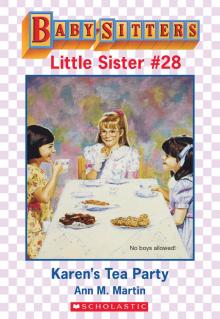 Karen's Tea Party
Karen's Tea Party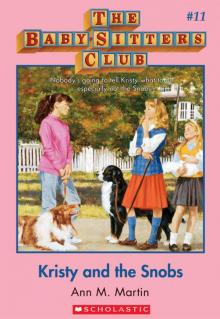 Kristy and the Snobs
Kristy and the Snobs Best Kept Secret
Best Kept Secret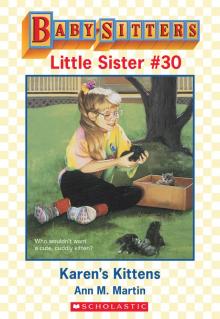 Karen's Kittens
Karen's Kittens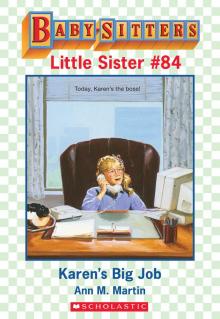 Karen's Big Job
Karen's Big Job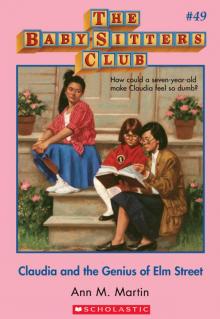 Claudia and the Genius of Elm Street
Claudia and the Genius of Elm Street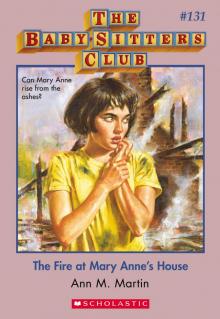 The Fire at Mary Anne's House
The Fire at Mary Anne's House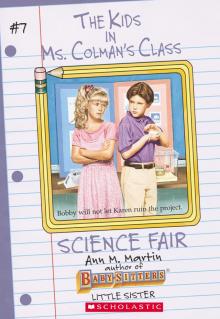 Science Fair
Science Fair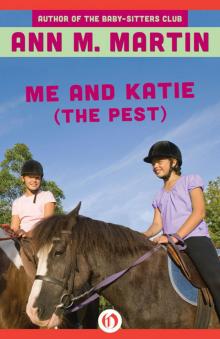 Me and Katie (The Pest)
Me and Katie (The Pest)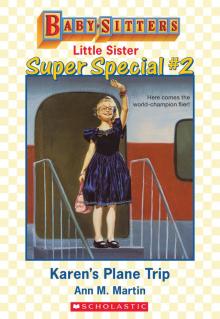 Karen's Plane Trip
Karen's Plane Trip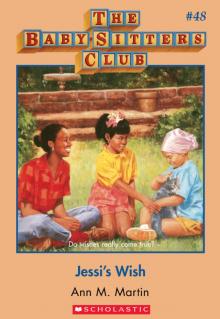 Jessi's Wish
Jessi's Wish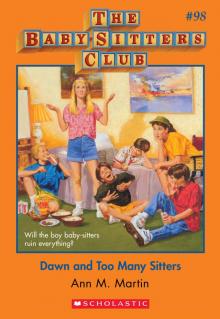 Dawn and Too Many Sitters
Dawn and Too Many Sitters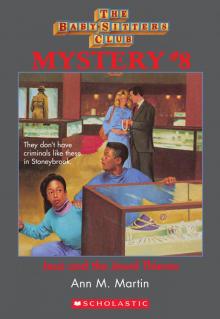 Jessi and the Jewel Thieves
Jessi and the Jewel Thieves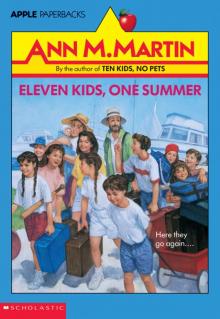 Eleven Kids, One Summer
Eleven Kids, One Summer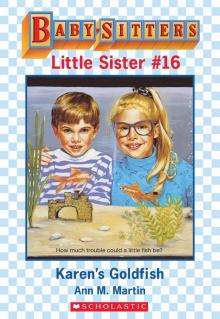 Karen's Goldfish
Karen's Goldfish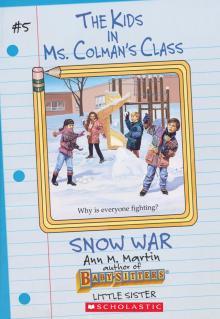 Snow War
Snow War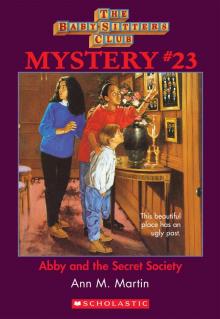 Abby and the Secret Society
Abby and the Secret Society Keeping Secrets
Keeping Secrets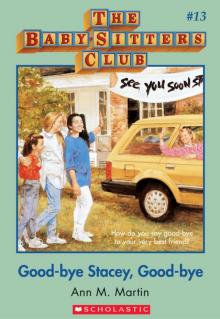 Good-Bye Stacey, Good-Bye
Good-Bye Stacey, Good-Bye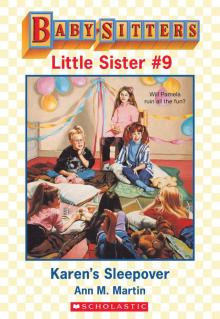 Karen's Sleepover
Karen's Sleepover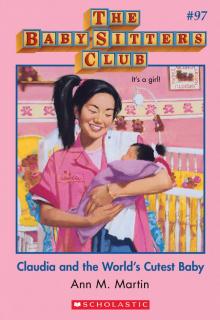 Claudia and the World's Cutest Baby
Claudia and the World's Cutest Baby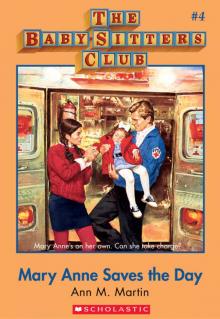 Mary Anne Saves the Day
Mary Anne Saves the Day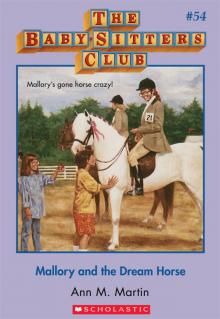 Mallory and the Dream Horse
Mallory and the Dream Horse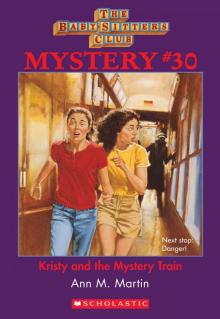 Kristy and the Mystery Train
Kristy and the Mystery Train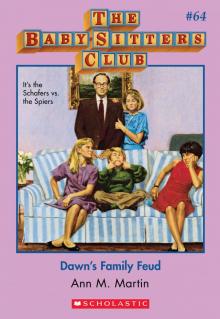 Dawn's Family Feud
Dawn's Family Feud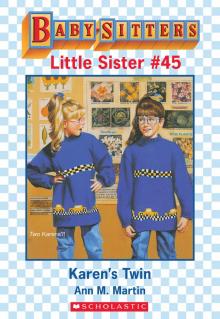 Karen's Twin
Karen's Twin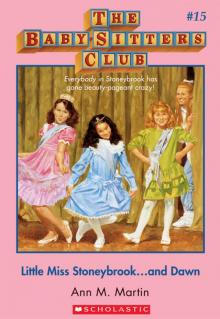 Little Miss Stoneybrook... And Dawn
Little Miss Stoneybrook... And Dawn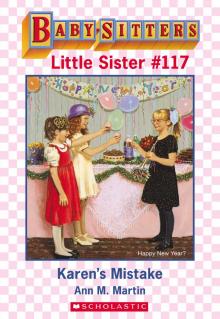 Karen's Mistake
Karen's Mistake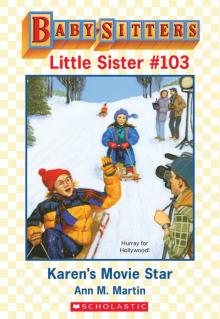 Karen's Movie Star
Karen's Movie Star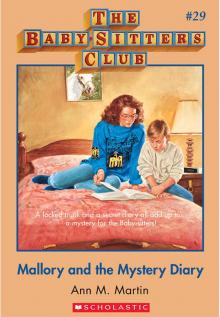 Mallory and the Mystery Diary
Mallory and the Mystery Diary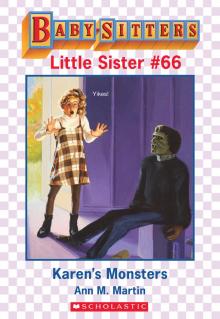 Karen's Monsters
Karen's Monsters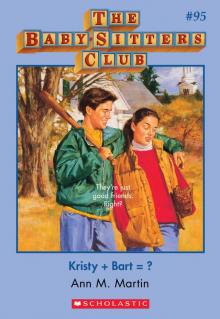 Kristy + Bart = ?
Kristy + Bart = ?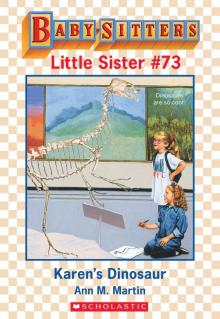 Karen's Dinosaur
Karen's Dinosaur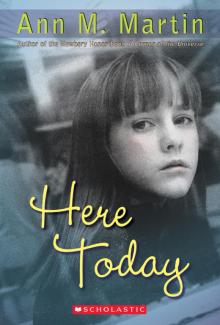 Here Today
Here Today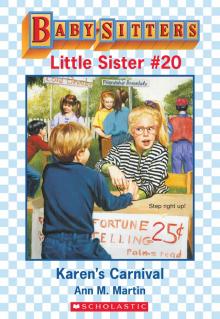 Karen's Carnival
Karen's Carnival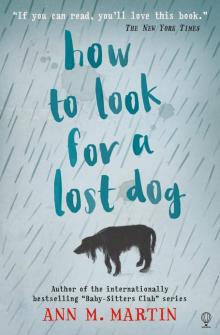 How to Look for a Lost Dog
How to Look for a Lost Dog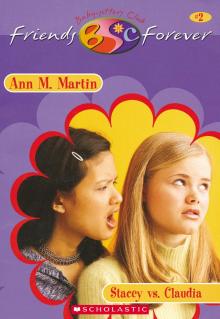 Stacey vs. Claudia
Stacey vs. Claudia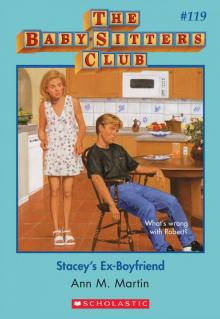 Stacey's Ex-Boyfriend
Stacey's Ex-Boyfriend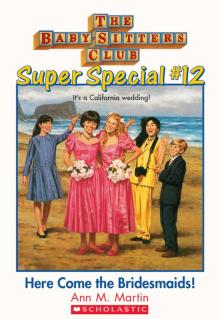 Here Come the Bridesmaids!
Here Come the Bridesmaids! Graduation Day
Graduation Day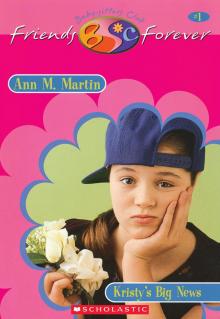 Kristy's Big News
Kristy's Big News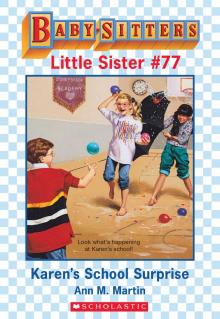 Karen's School Surprise
Karen's School Surprise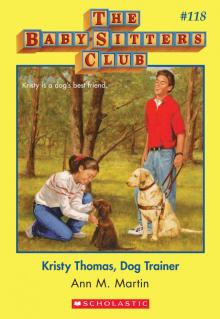 Kristy Thomas, Dog Trainer
Kristy Thomas, Dog Trainer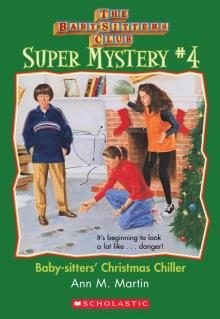 Baby-Sitters' Christmas Chiller
Baby-Sitters' Christmas Chiller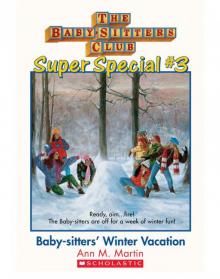 Baby-Sitters' Winter Vacation
Baby-Sitters' Winter Vacation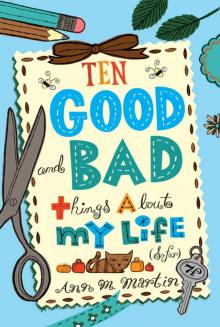 Ten Good and Bad Things About My Life
Ten Good and Bad Things About My Life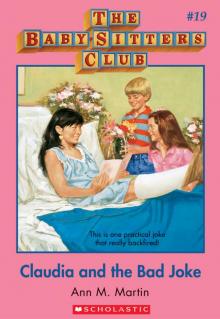 Claudia and the Bad Joke
Claudia and the Bad Joke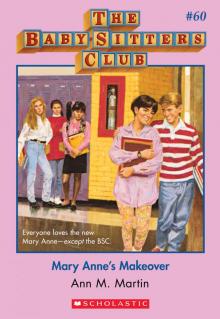 Mary Anne's Makeover
Mary Anne's Makeover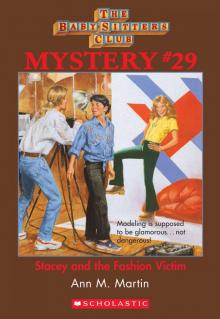 Stacey and the Fashion Victim
Stacey and the Fashion Victim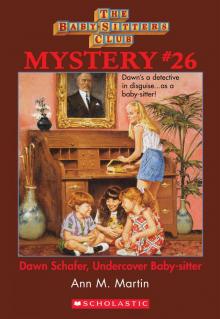 Dawn Schafer, Undercover Baby-Sitter
Dawn Schafer, Undercover Baby-Sitter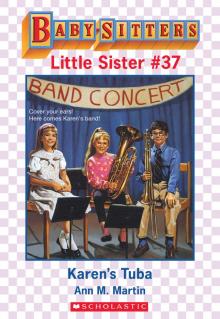 Karen's Tuba
Karen's Tuba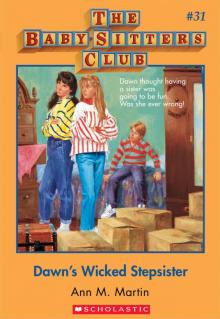 Dawn's Wicked Stepsister
Dawn's Wicked Stepsister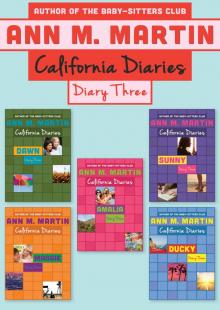 Diary Three: Dawn, Sunny, Maggie, Amalia, and Ducky
Diary Three: Dawn, Sunny, Maggie, Amalia, and Ducky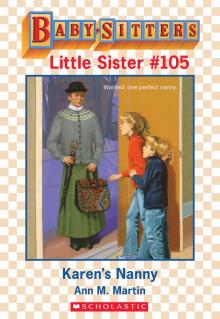 Karen's Nanny
Karen's Nanny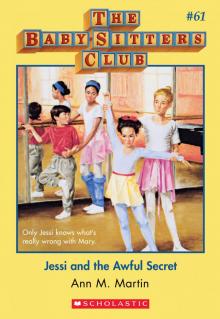 Jessi and the Awful Secret
Jessi and the Awful Secret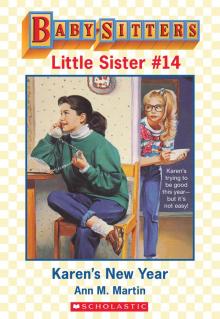 Karen's New Year
Karen's New Year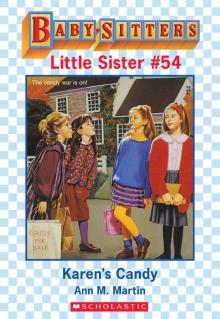 Karen's Candy
Karen's Candy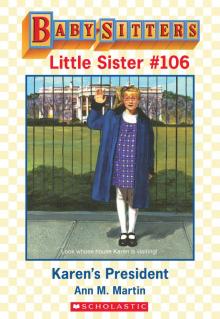 Karen's President
Karen's President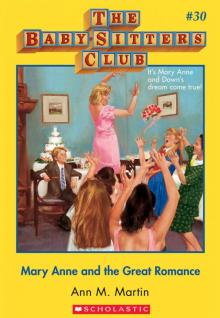 Mary Anne and the Great Romance
Mary Anne and the Great Romance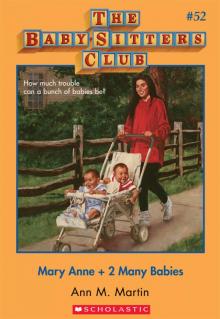 Mary Anne + 2 Many Babies
Mary Anne + 2 Many Babies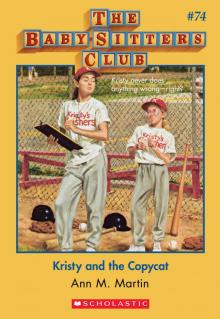 Kristy and the Copycat
Kristy and the Copycat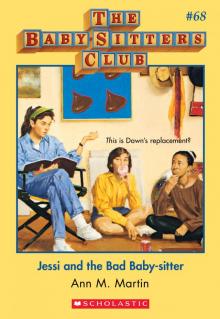 Jessi and the Bad Baby-Sitter
Jessi and the Bad Baby-Sitter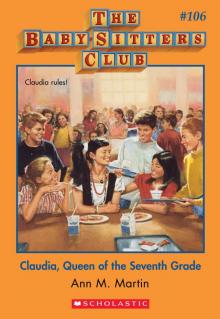 Claudia, Queen of the Seventh Grade
Claudia, Queen of the Seventh Grade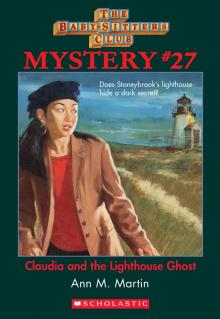 Claudia and the Lighthouse Ghost
Claudia and the Lighthouse Ghost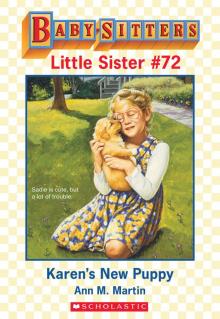 Karen's New Puppy
Karen's New Puppy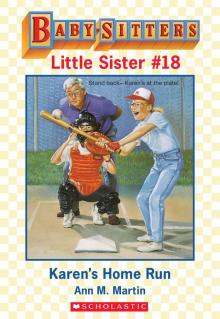 Karen's Home Run
Karen's Home Run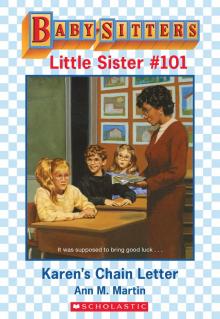 Karen's Chain Letter
Karen's Chain Letter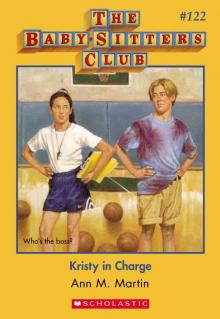 Kristy in Charge
Kristy in Charge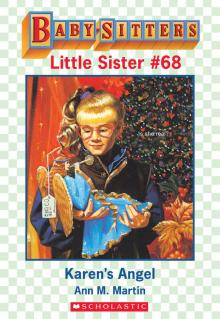 Karen's Angel
Karen's Angel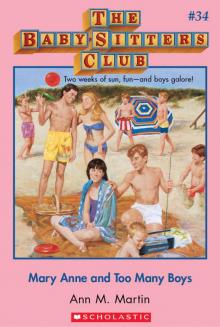 Mary Anne and Too Many Boys
Mary Anne and Too Many Boys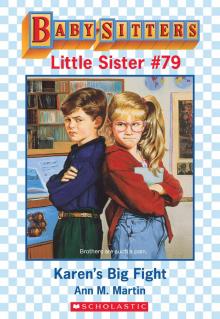 Karen's Big Fight
Karen's Big Fight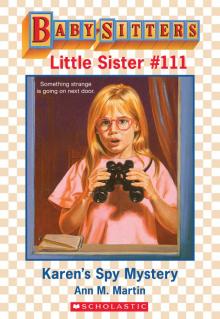 Karen's Spy Mystery
Karen's Spy Mystery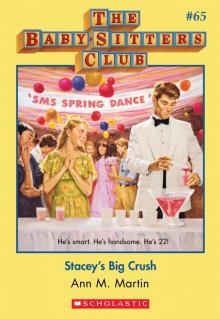 Stacey's Big Crush
Stacey's Big Crush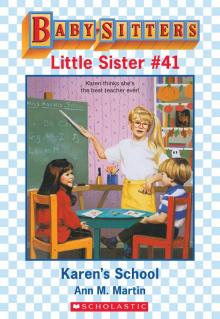 Karen's School
Karen's School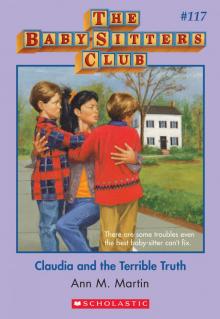 Claudia and the Terrible Truth
Claudia and the Terrible Truth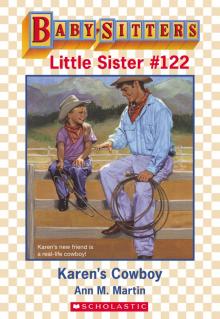 Karen's Cowboy
Karen's Cowboy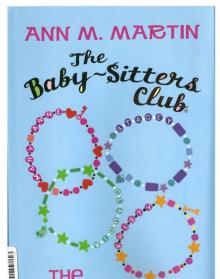 The Summer Before
The Summer Before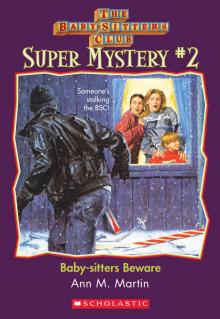 Beware, Dawn!
Beware, Dawn!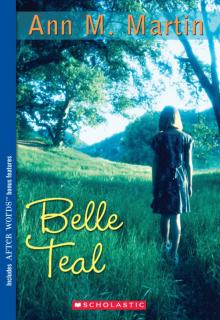 Belle Teale
Belle Teale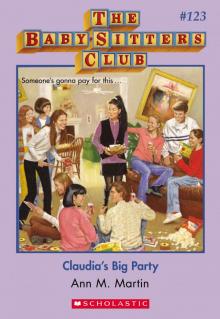 Claudia's Big Party
Claudia's Big Party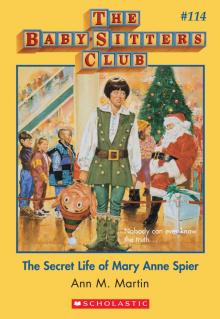 The Secret Life of Mary Anne Spier
The Secret Life of Mary Anne Spier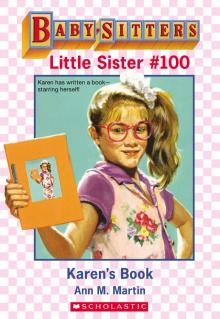 Karen's Book
Karen's Book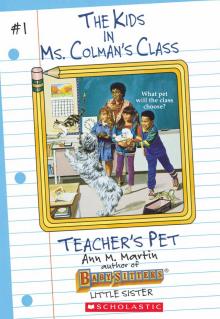 Teacher's Pet
Teacher's Pet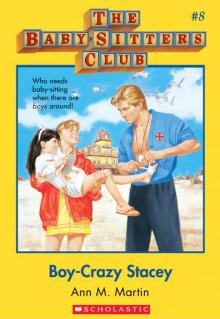 Boy-Crazy Stacey
Boy-Crazy Stacey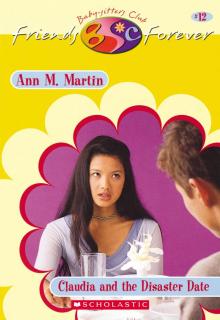 Claudia and the Disaster Date
Claudia and the Disaster Date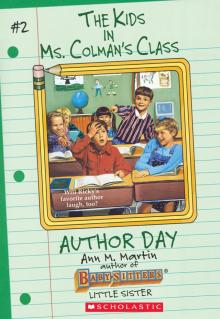 Author Day
Author Day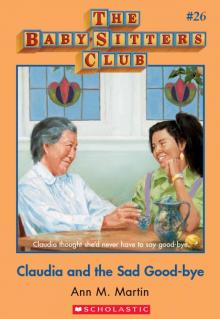 Claudia and the Sad Good-Bye
Claudia and the Sad Good-Bye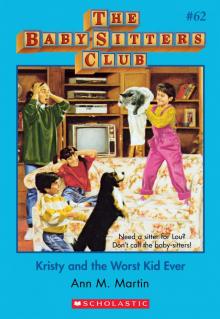 Kristy and the Worst Kid Ever
Kristy and the Worst Kid Ever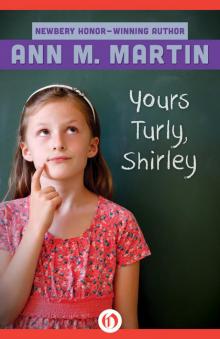 Yours Turly, Shirley
Yours Turly, Shirley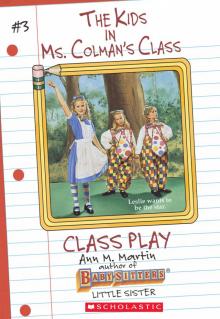 Class Play
Class Play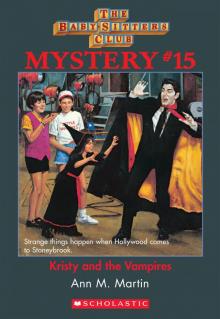 Kristy and the Vampires
Kristy and the Vampires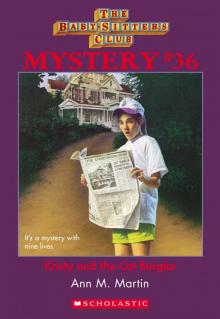 Kristy and the Cat Burglar
Kristy and the Cat Burglar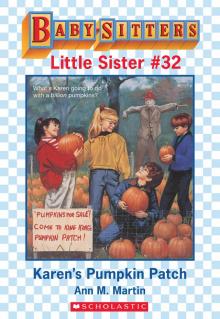 Karen's Pumpkin Patch
Karen's Pumpkin Patch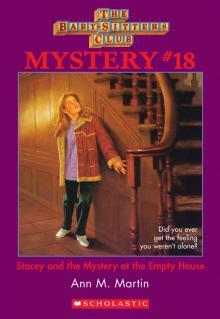 Stacey and the Mystery at the Empty House
Stacey and the Mystery at the Empty House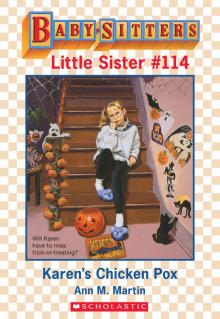 Karen's Chicken Pox
Karen's Chicken Pox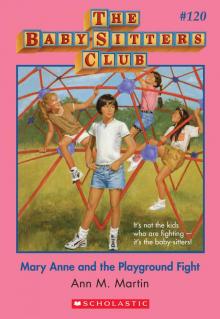 Mary Anne and the Playground Fight
Mary Anne and the Playground Fight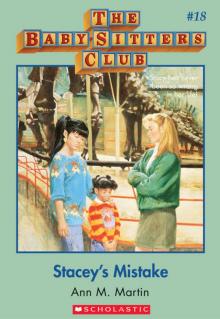 Stacey's Mistake
Stacey's Mistake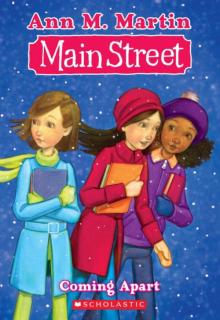 Coming Apart
Coming Apart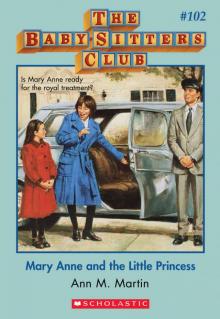 Mary Anne and the Little Princess
Mary Anne and the Little Princess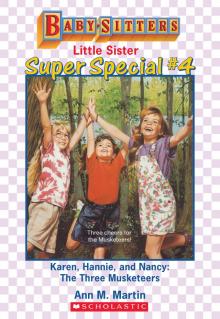 Karen, Hannie and Nancy: The Three Musketeers
Karen, Hannie and Nancy: The Three Musketeers 'Tis the Season
'Tis the Season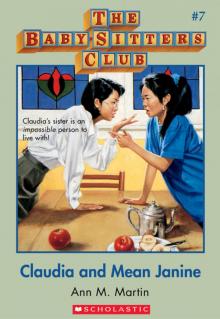 Claudia and Mean Janine
Claudia and Mean Janine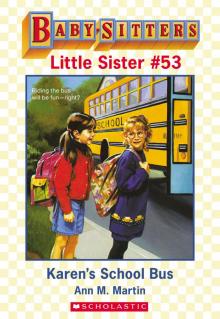 Karen's School Bus
Karen's School Bus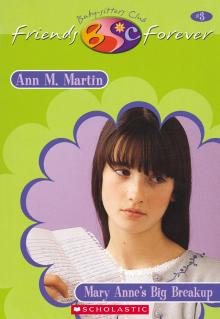 Mary Anne's Big Breakup
Mary Anne's Big Breakup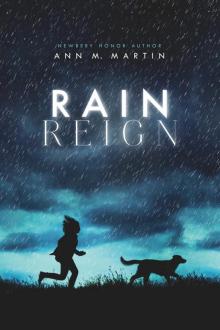 Rain Reign
Rain Reign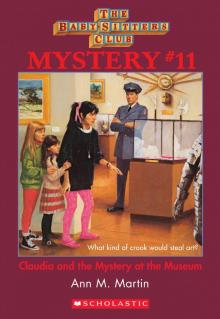 Claudia and the Mystery at the Museum
Claudia and the Mystery at the Museum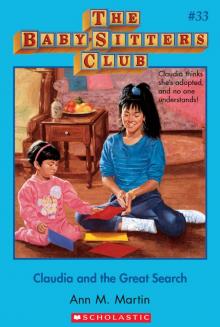 Claudia and the Great Search
Claudia and the Great Search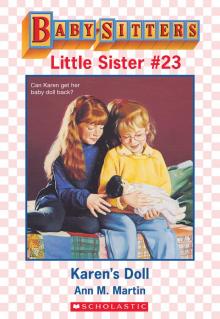 Karen's Doll
Karen's Doll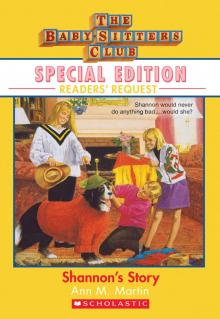 Shannon's Story
Shannon's Story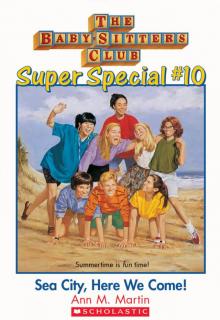 Sea City, Here We Come!
Sea City, Here We Come!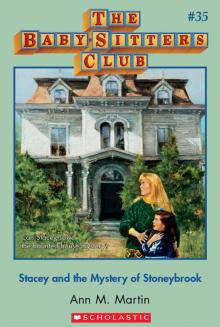 Stacey and the Mystery of Stoneybrook
Stacey and the Mystery of Stoneybrook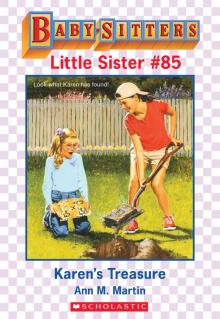 Karen's Treasure
Karen's Treasure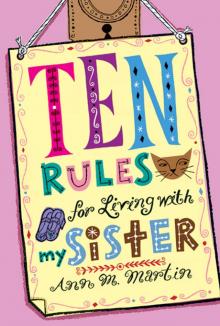 Ten Rules for Living With My Sister
Ten Rules for Living With My Sister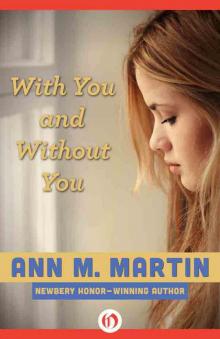 With You and Without You
With You and Without You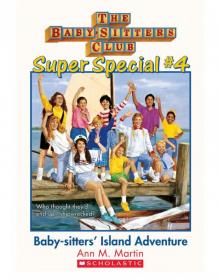 Baby-Sitters' Island Adventure
Baby-Sitters' Island Adventure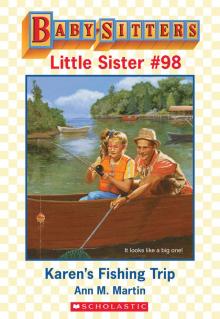 Karen's Fishing Trip
Karen's Fishing Trip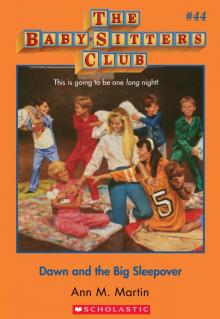 Dawn and the Big Sleepover
Dawn and the Big Sleepover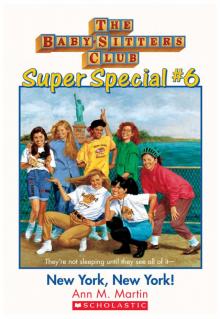 New York, New York!
New York, New York!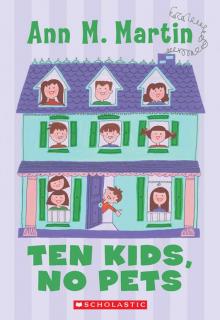 Ten Kids, No Pets
Ten Kids, No Pets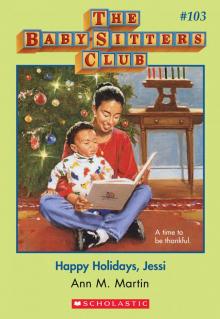 Happy Holidays, Jessi
Happy Holidays, Jessi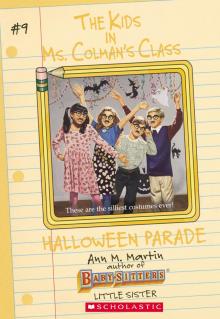 Halloween Parade
Halloween Parade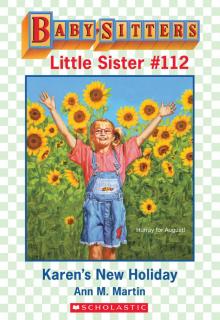 Karen's New Holiday
Karen's New Holiday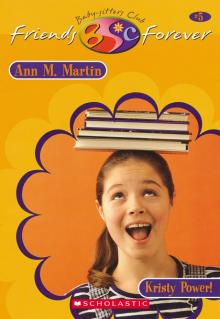 Kristy Power!
Kristy Power!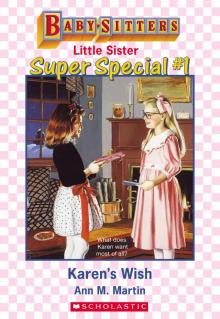 Karen's Wish
Karen's Wish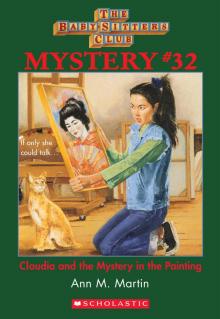 Claudia and the Mystery in the Painting
Claudia and the Mystery in the Painting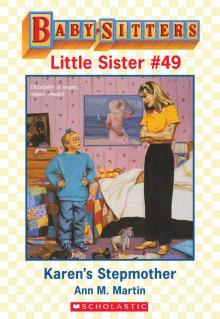 Karen's Stepmother
Karen's Stepmother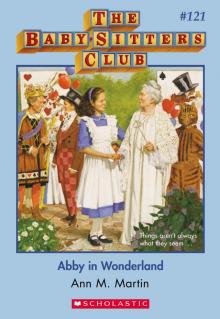 Abby in Wonderland
Abby in Wonderland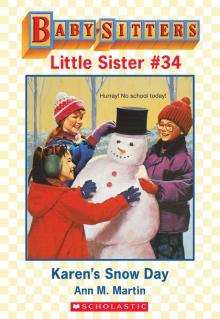 Karen's Snow Day
Karen's Snow Day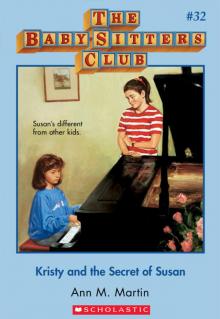 Kristy and the Secret of Susan
Kristy and the Secret of Susan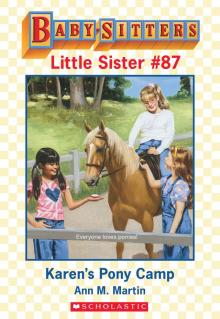 Karen's Pony Camp
Karen's Pony Camp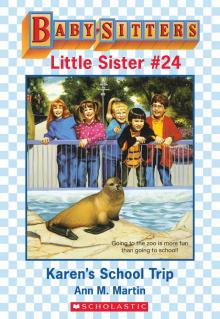 Karen's School Trip
Karen's School Trip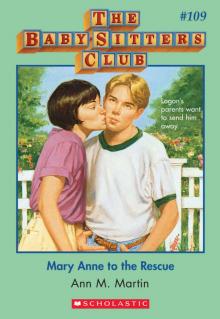 Mary Anne to the Rescue
Mary Anne to the Rescue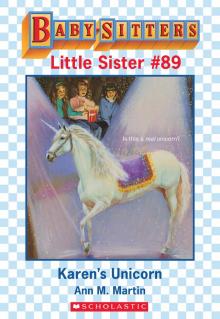 Karen's Unicorn
Karen's Unicorn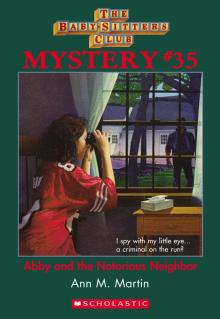 Abby and the Notorious Neighbor
Abby and the Notorious Neighbor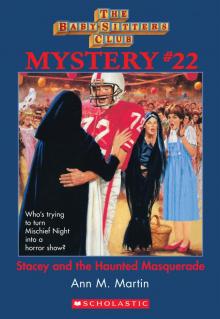 Stacey and the Haunted Masquerade
Stacey and the Haunted Masquerade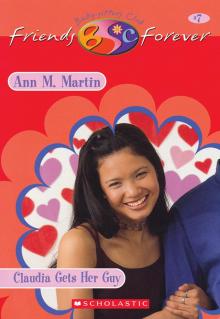 Claudia Gets Her Guy
Claudia Gets Her Guy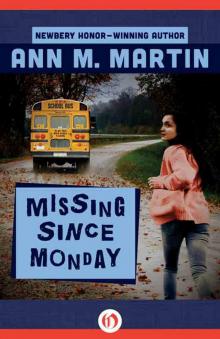 Missing Since Monday
Missing Since Monday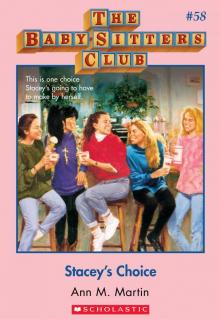 Stacey's Choice
Stacey's Choice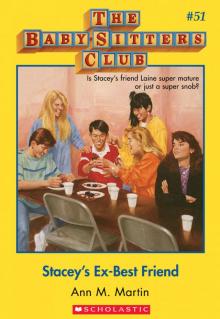 Stacey's Ex-Best Friend
Stacey's Ex-Best Friend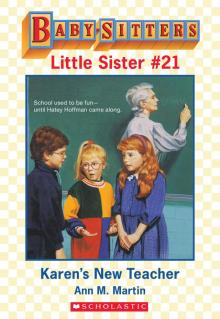 Karen's New Teacher
Karen's New Teacher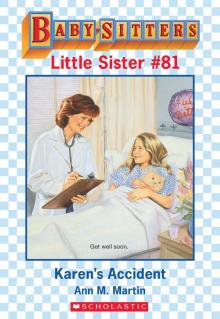 Karen's Accident
Karen's Accident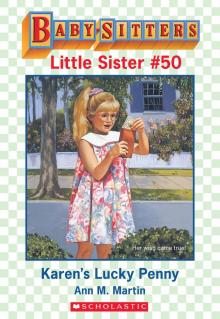 Karen's Lucky Penny
Karen's Lucky Penny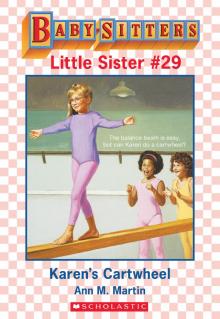 Karen's Cartwheel
Karen's Cartwheel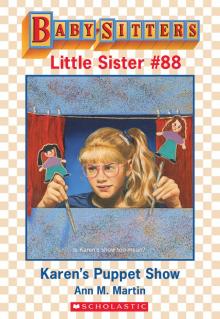 Karen's Puppet Show
Karen's Puppet Show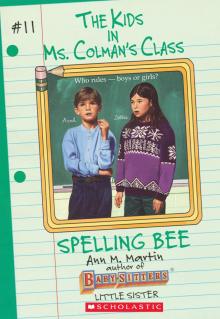 Spelling Bee
Spelling Bee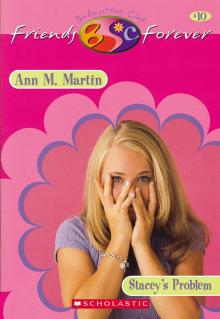 Stacey's Problem
Stacey's Problem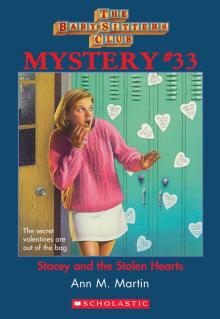 Stacey and the Stolen Hearts
Stacey and the Stolen Hearts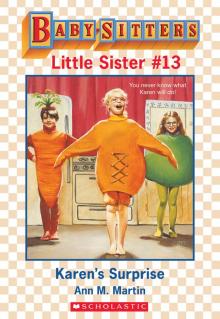 Karen's Surprise
Karen's Surprise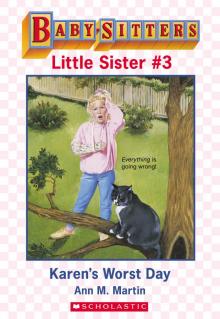 Karen's Worst Day
Karen's Worst Day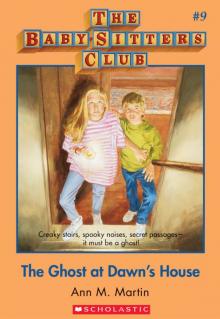 The Ghost at Dawn's House
The Ghost at Dawn's House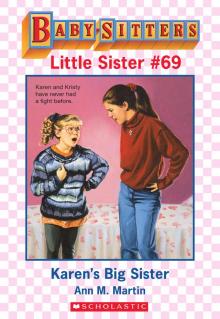 Karen's Big Sister
Karen's Big Sister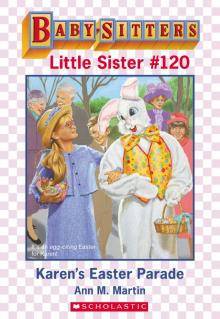 Karen's Easter Parade
Karen's Easter Parade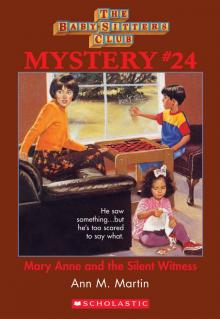 Mary Anne and the Silent Witness
Mary Anne and the Silent Witness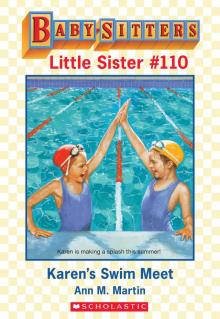 Karen's Swim Meet
Karen's Swim Meet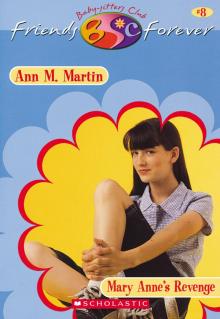 Mary Anne's Revenge
Mary Anne's Revenge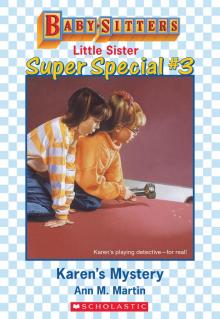 Karen's Mystery
Karen's Mystery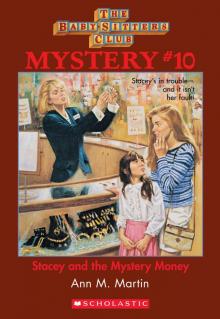 Stacey and the Mystery Money
Stacey and the Mystery Money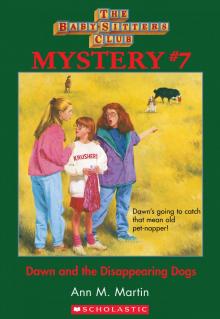 Dawn and the Disappearing Dogs
Dawn and the Disappearing Dogs Karen's Christmas Tree
Karen's Christmas Tree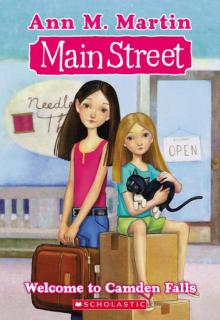 Welcome to Camden Falls
Welcome to Camden Falls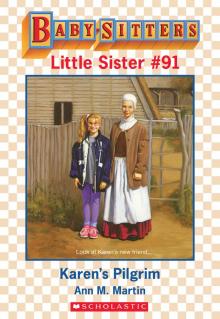 Karen's Pilgrim
Karen's Pilgrim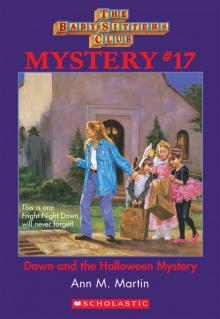 Dawn and the Halloween Mystery
Dawn and the Halloween Mystery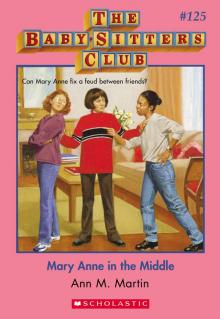 Mary Anne in the Middle
Mary Anne in the Middle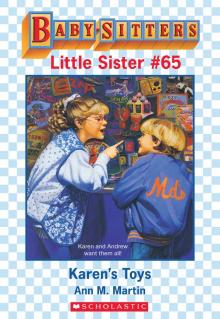 Karen's Toys
Karen's Toys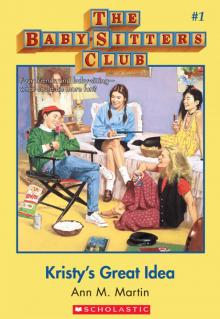 Kristy's Great Idea
Kristy's Great Idea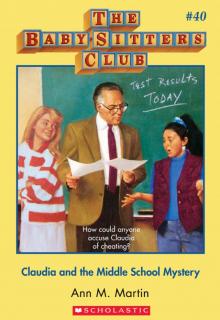 Claudia and the Middle School Mystery
Claudia and the Middle School Mystery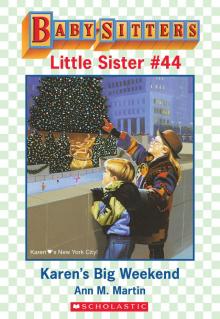 Karen's Big Weekend
Karen's Big Weekend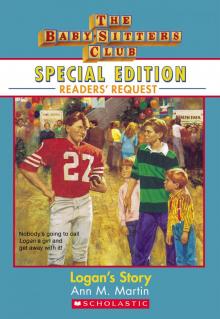 Logan's Story
Logan's Story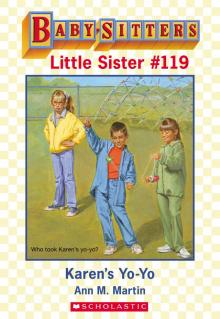 Karen's Yo-Yo
Karen's Yo-Yo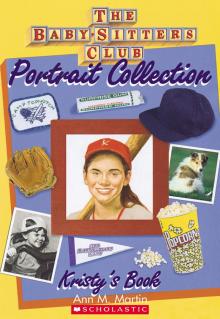 Kristy's Book
Kristy's Book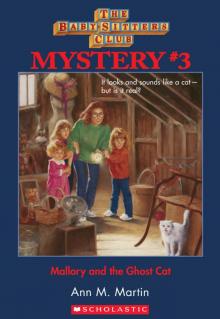 Mallory and the Ghost Cat
Mallory and the Ghost Cat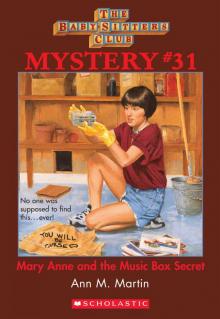 Mary Anne and the Music
Mary Anne and the Music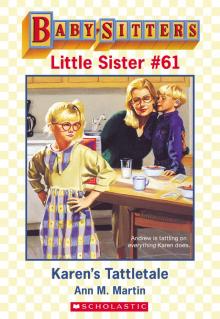 Karen's Tattletale
Karen's Tattletale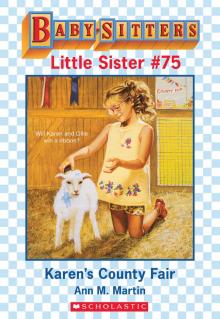 Karen's County Fair
Karen's County Fair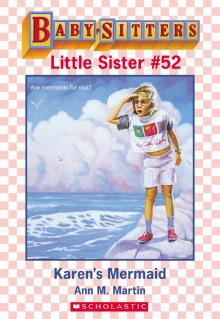 Karen's Mermaid
Karen's Mermaid Snowbound
Snowbound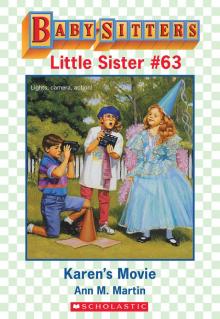 Karen's Movie
Karen's Movie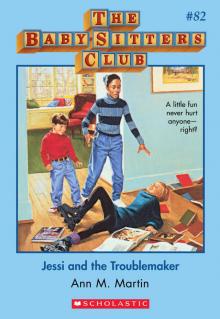 Jessi and the Troublemaker
Jessi and the Troublemaker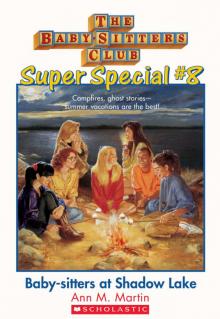 Baby-Sitters at Shadow Lake
Baby-Sitters at Shadow Lake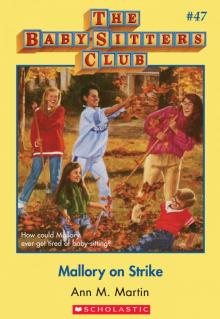 Mallory on Strike
Mallory on Strike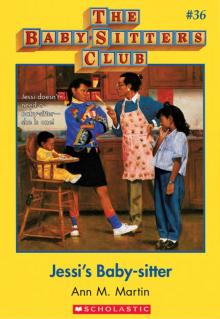 Jessi's Baby-Sitter
Jessi's Baby-Sitter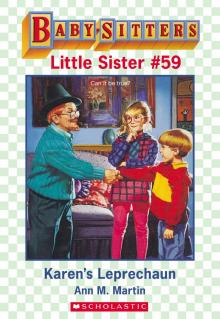 Karen's Leprechaun
Karen's Leprechaun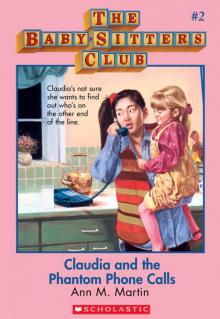 Claudia and the Phantom Phone Calls
Claudia and the Phantom Phone Calls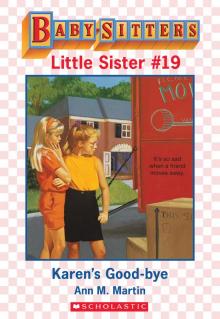 Karen's Good-Bye
Karen's Good-Bye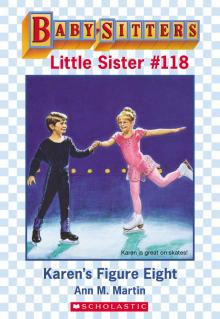 Karen's Figure Eight
Karen's Figure Eight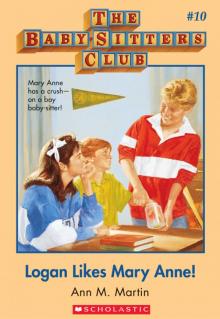 Logan Likes Mary Anne!
Logan Likes Mary Anne!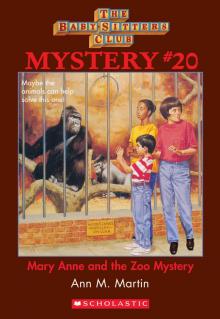 Mary Anne and the Zoo Mystery
Mary Anne and the Zoo Mystery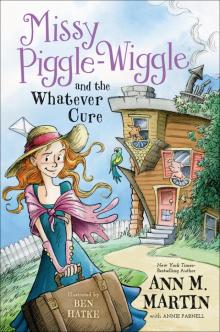 Missy Piggle-Wiggle and the Whatever Cure
Missy Piggle-Wiggle and the Whatever Cure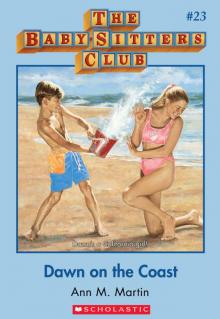 Dawn on the Coast
Dawn on the Coast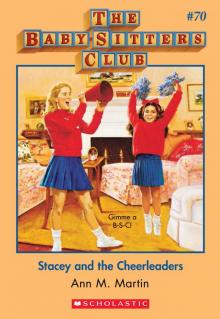 Stacey and the Cheerleaders
Stacey and the Cheerleaders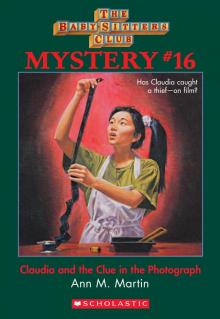 Claudia and the Clue in the Photograph
Claudia and the Clue in the Photograph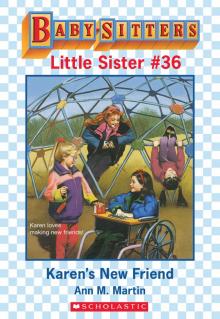 Karen's New Friend
Karen's New Friend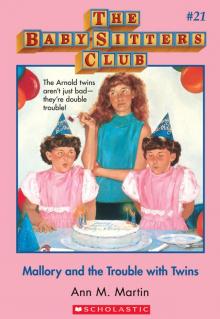 Mallory and the Trouble With Twins
Mallory and the Trouble With Twins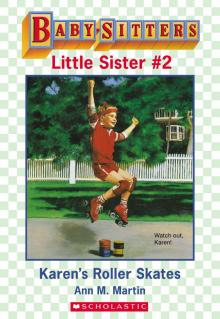 Karen's Roller Skates
Karen's Roller Skates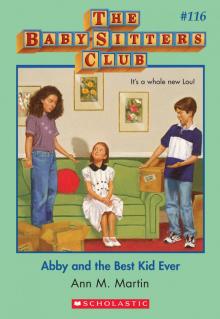 Abby and the Best Kid Ever
Abby and the Best Kid Ever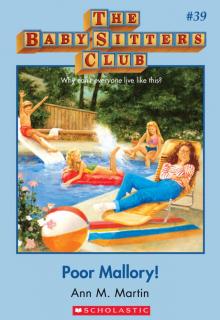 Poor Mallory!
Poor Mallory!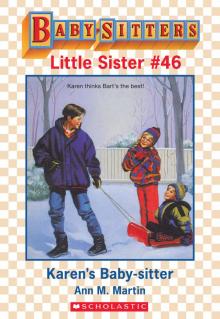 Karen's Witch
Karen's Witch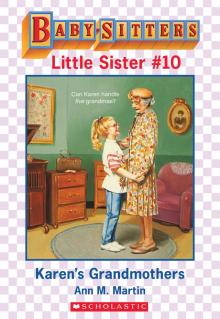 Karen's Grandmothers
Karen's Grandmothers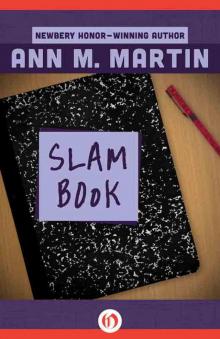 Slam Book
Slam Book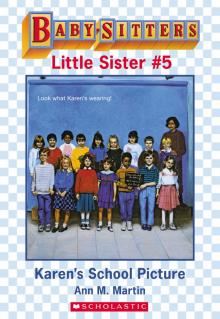 Karen's School Picture
Karen's School Picture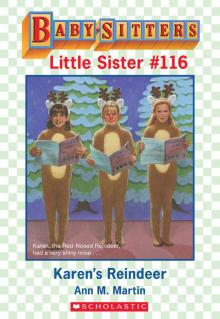 Karen's Reindeer
Karen's Reindeer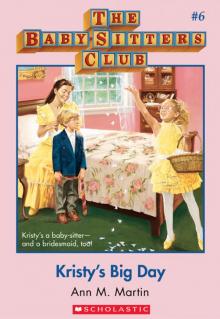 Kristy's Big Day
Kristy's Big Day The Long Way Home
The Long Way Home Karen's Sleigh Ride
Karen's Sleigh Ride On Christmas Eve
On Christmas Eve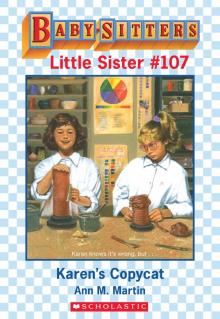 Karen's Copycat
Karen's Copycat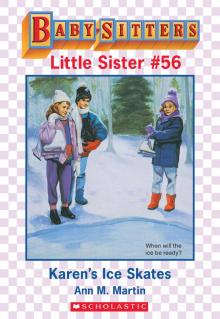 Karen's Ice Skates
Karen's Ice Skates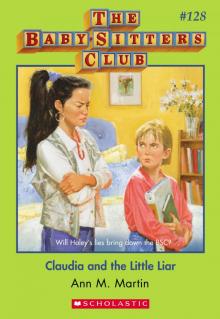 Claudia and the Little Liar
Claudia and the Little Liar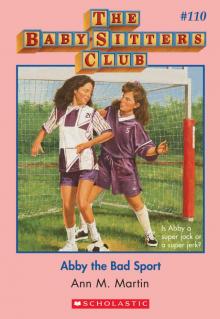 Abby the Bad Sport
Abby the Bad Sport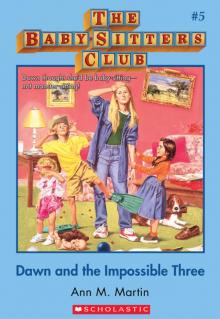 The Baby-Sitters Club #5: Dawn and the Impossible Three
The Baby-Sitters Club #5: Dawn and the Impossible Three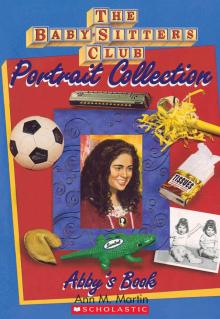 Abby's Book
Abby's Book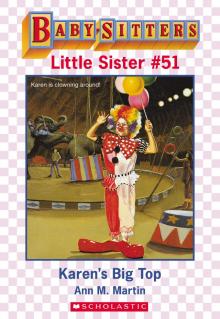 Karen's Big Top
Karen's Big Top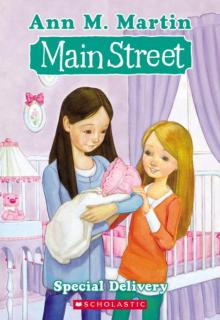 Main Street #8: Special Delivery
Main Street #8: Special Delivery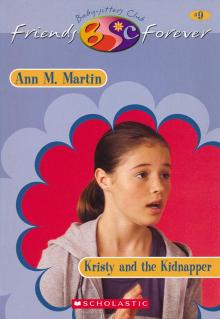 Kristy and the Kidnapper
Kristy and the Kidnapper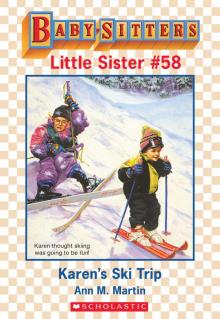 Karen's Ski Trip
Karen's Ski Trip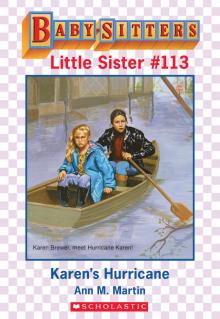 Karen's Hurricane
Karen's Hurricane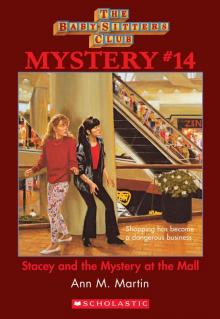 Stacey and the Mystery at the Mall
Stacey and the Mystery at the Mall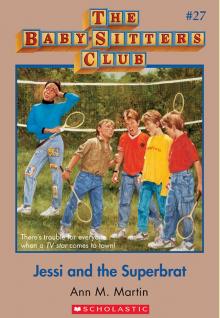 Jessi and the Superbrat
Jessi and the Superbrat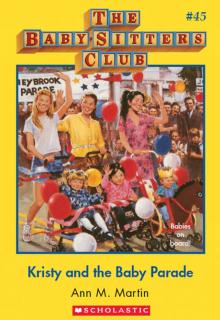 Kristy and the Baby Parade
Kristy and the Baby Parade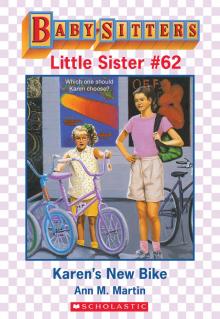 Karen's New Bike
Karen's New Bike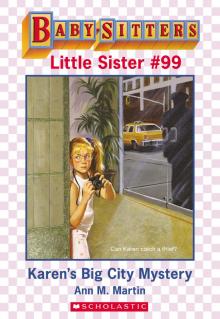 Karen's Big City Mystery
Karen's Big City Mystery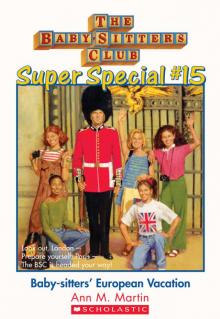 Baby-Sitters' European Vacation
Baby-Sitters' European Vacation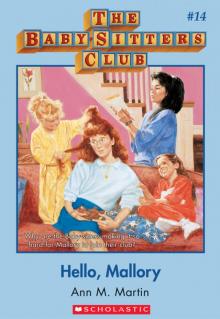 Hello, Mallory
Hello, Mallory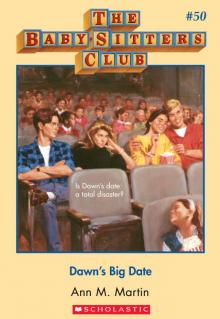 Dawn's Big Date
Dawn's Big Date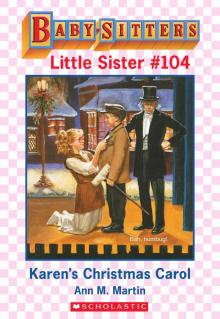 Karen's Christmas Carol
Karen's Christmas Carol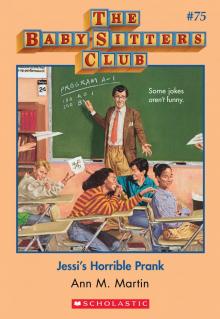 Jessi's Horrible Prank
Jessi's Horrible Prank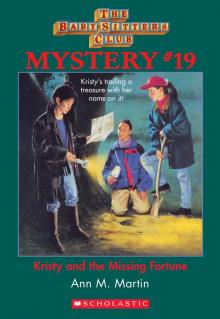 Kristy and the Missing Fortune
Kristy and the Missing Fortune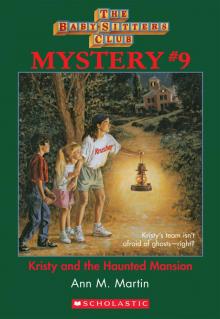 Kristy and the Haunted Mansion
Kristy and the Haunted Mansion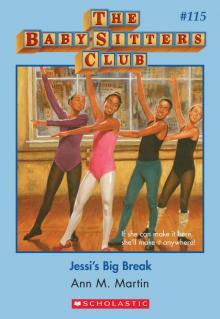 Jessi's Big Break
Jessi's Big Break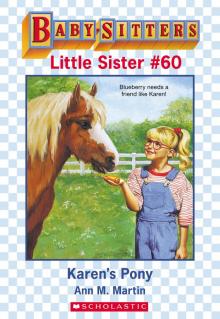 Karen's Pony
Karen's Pony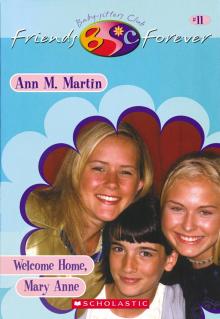 Welcome Home, Mary Anne
Welcome Home, Mary Anne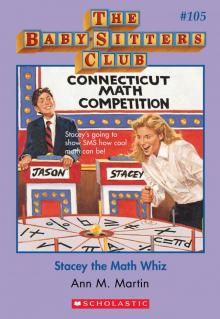 Stacey the Math Whiz
Stacey the Math Whiz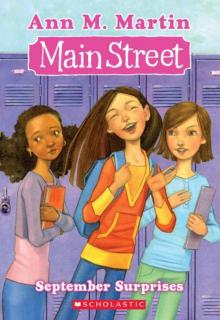 September Surprises
September Surprises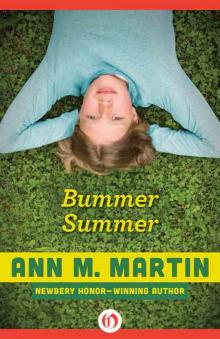 Bummer Summer
Bummer Summer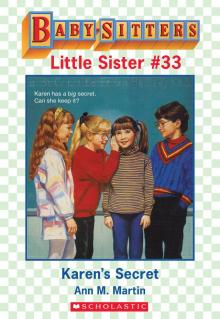 Karen's Secret
Karen's Secret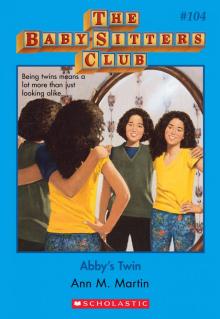 Abby's Twin
Abby's Twin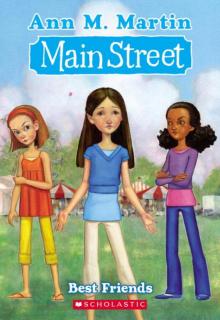 Main Street #4: Best Friends
Main Street #4: Best Friends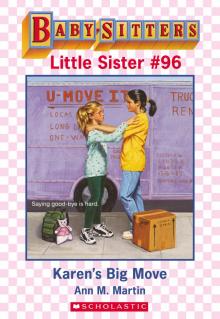 Karen's Big Move
Karen's Big Move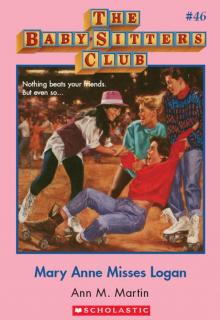 Mary Anne Misses Logan
Mary Anne Misses Logan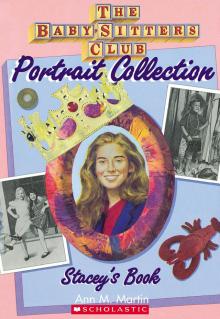 Stacey's Book
Stacey's Book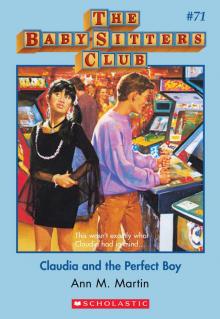 Claudia and the Perfect Boy
Claudia and the Perfect Boy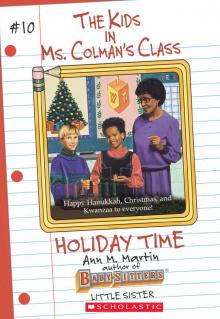 Holiday Time
Holiday Time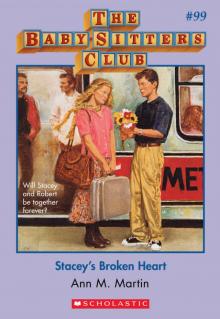 Stacey's Broken Heart
Stacey's Broken Heart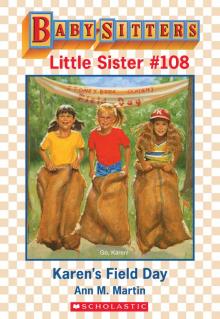 Karen's Field Day
Karen's Field Day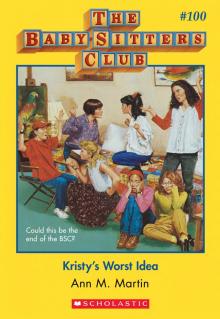 Kristy's Worst Idea
Kristy's Worst Idea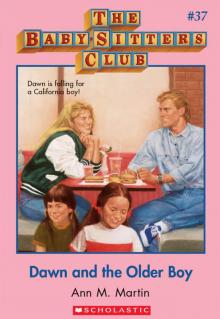 Dawn and the Older Boy
Dawn and the Older Boy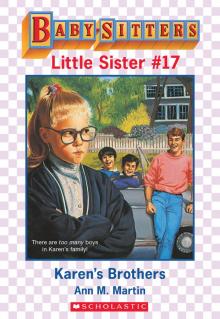 Karen's Brothers
Karen's Brothers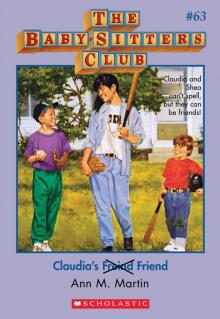 Claudia's Friend
Claudia's Friend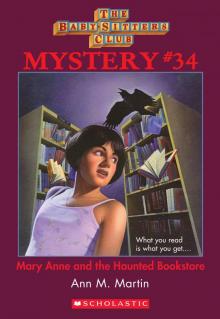 Mary Anne and the Haunted Bookstore
Mary Anne and the Haunted Bookstore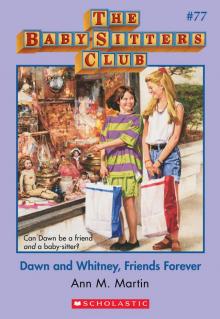 Dawn and Whitney, Friends Forever
Dawn and Whitney, Friends Forever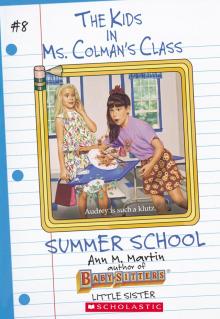 Summer School
Summer School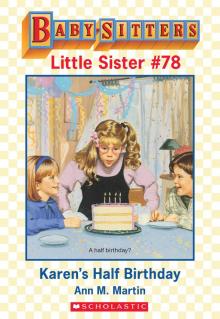 Karen's Birthday
Karen's Birthday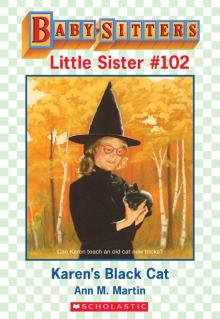 Karen's Black Cat
Karen's Black Cat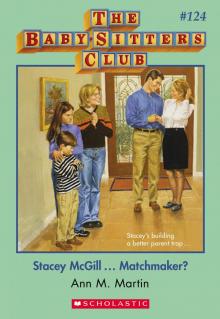 Stacey McGill... Matchmaker?
Stacey McGill... Matchmaker?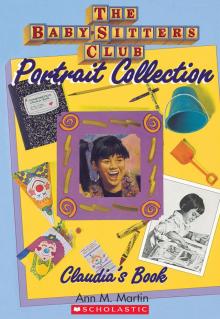 Claudia's Book
Claudia's Book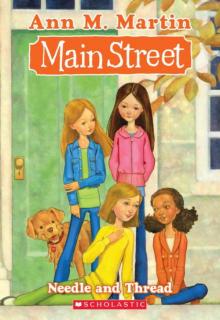 Main Street #2: Needle and Thread
Main Street #2: Needle and Thread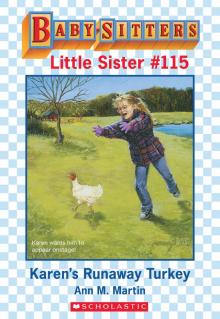 Karen's Runaway Turkey
Karen's Runaway Turkey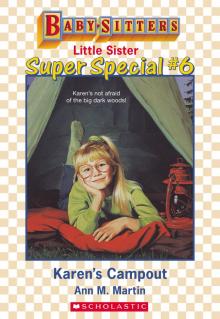 Karen's Campout
Karen's Campout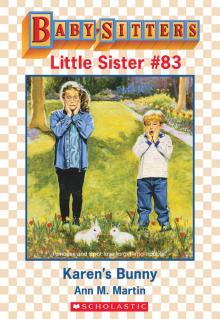 Karen's Bunny
Karen's Bunny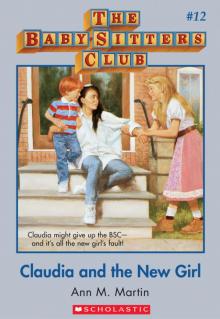 Claudia and the New Girl
Claudia and the New Girl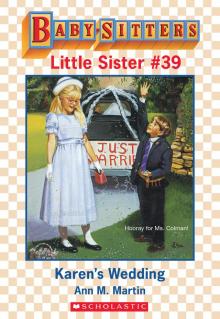 Karen's Wedding
Karen's Wedding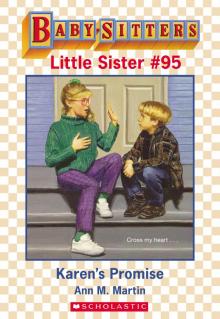 Karen's Promise
Karen's Promise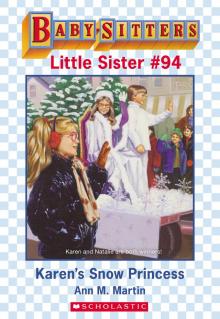 Karen's Snow Princess
Karen's Snow Princess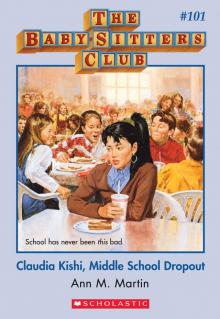 Claudia Kishi, Middle School Dropout
Claudia Kishi, Middle School Dropout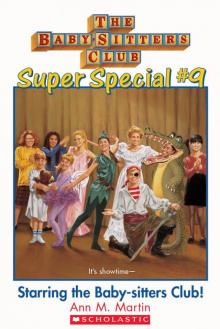 Starring the Baby-Sitters Club!
Starring the Baby-Sitters Club!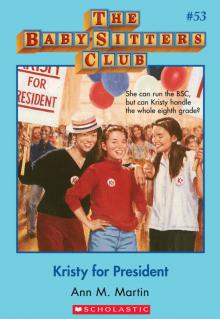 Kristy for President
Kristy for President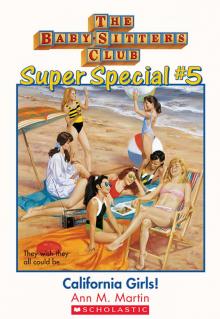 California Girls!
California Girls!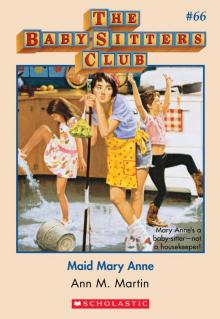 Maid Mary Anne
Maid Mary Anne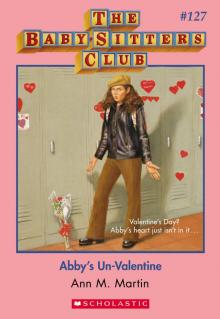 Abby's Un-Valentine
Abby's Un-Valentine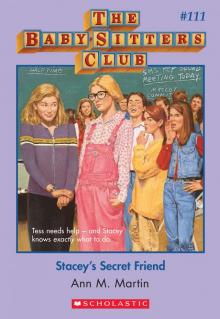 Stacey's Secret Friend
Stacey's Secret Friend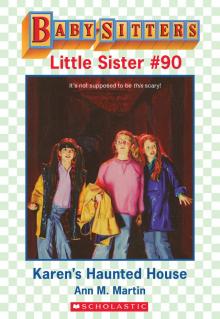 Karen's Haunted House
Karen's Haunted House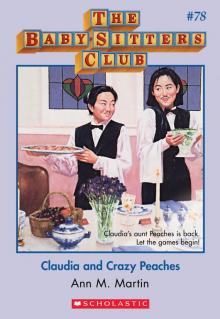 Claudia and Crazy Peaches
Claudia and Crazy Peaches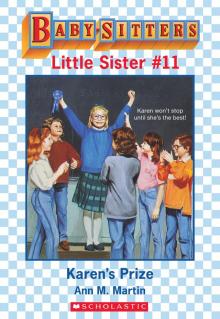 Karen's Prize
Karen's Prize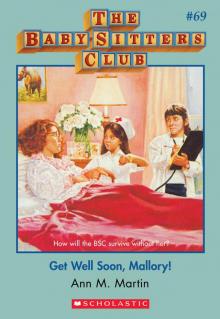 Get Well Soon, Mallory!
Get Well Soon, Mallory!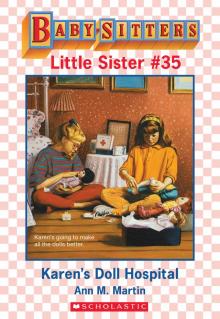 Karen's Doll Hospital
Karen's Doll Hospital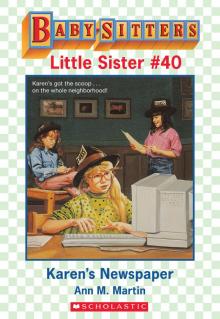 Karen's Newspaper
Karen's Newspaper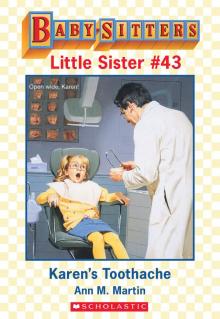 Karen's Toothache
Karen's Toothache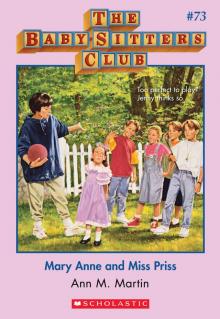 Mary Anne and Miss Priss
Mary Anne and Miss Priss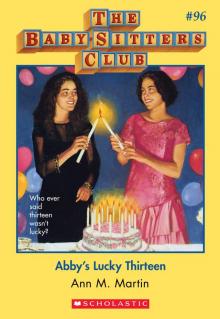 Abby's Lucky Thirteen
Abby's Lucky Thirteen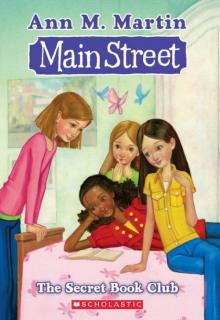 The Secret Book Club
The Secret Book Club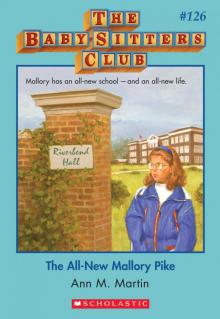 The All-New Mallory Pike
The All-New Mallory Pike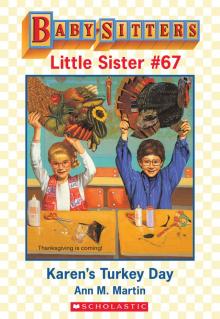 Karen's Turkey Day
Karen's Turkey Day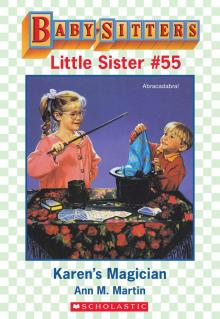 Karen's Magician
Karen's Magician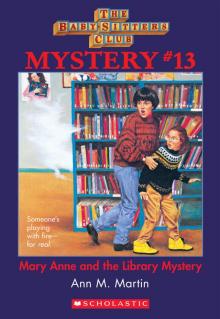 Mary Anne and the Library Mystery
Mary Anne and the Library Mystery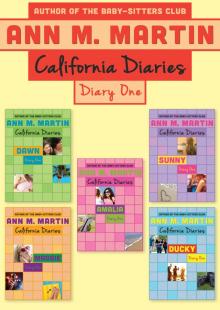 Diary One: Dawn, Sunny, Maggie, Amalia, and Ducky
Diary One: Dawn, Sunny, Maggie, Amalia, and Ducky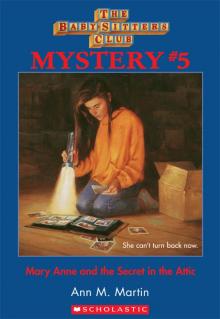 Mary Anne and the Secret in the Attic
Mary Anne and the Secret in the Attic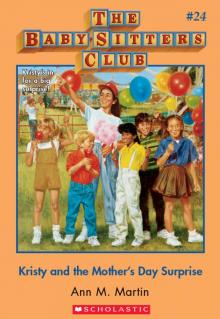 Kristy and the Mother's Day Surprise
Kristy and the Mother's Day Surprise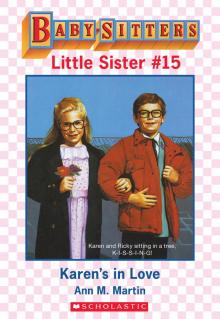 Karen's in Love
Karen's in Love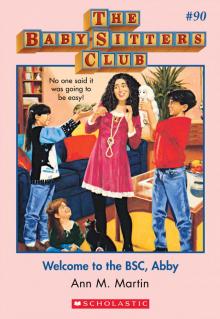 Welcome to the BSC, Abby
Welcome to the BSC, Abby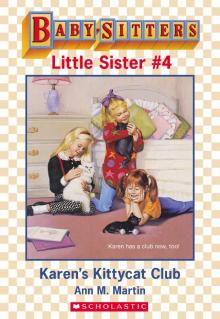 Karen's Kittycat Club
Karen's Kittycat Club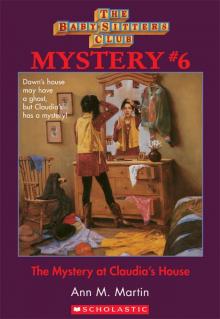 The Mystery at Claudia's House
The Mystery at Claudia's House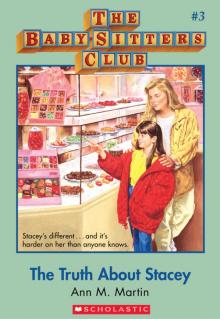 The Truth About Stacey
The Truth About Stacey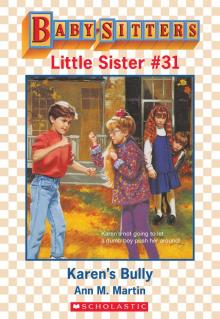 Karen's Bully
Karen's Bully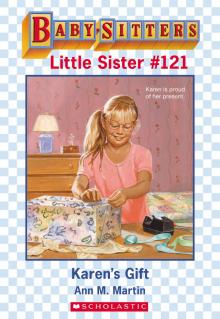 Karen's Gift
Karen's Gift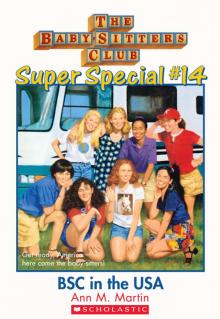 BSC in the USA
BSC in the USA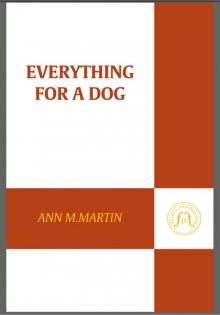 Everything for a Dog
Everything for a Dog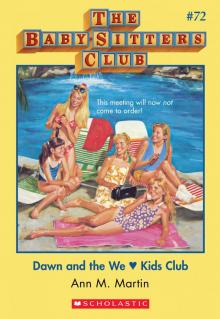 Dawn and the We Love Kids Club
Dawn and the We Love Kids Club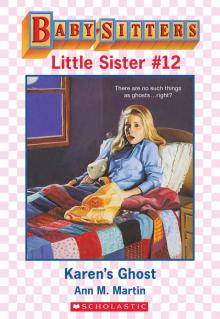 Karen's Ghost
Karen's Ghost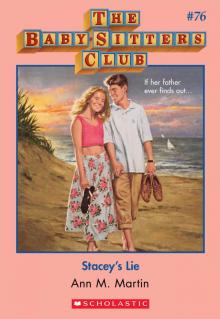 Stacey's Lie
Stacey's Lie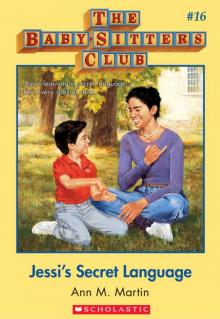 Jessi's Secret Language
Jessi's Secret Language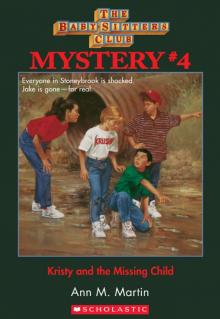 Kristy and the Missing Child
Kristy and the Missing Child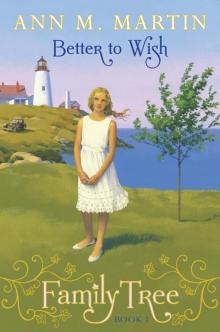 Better to Wish
Better to Wish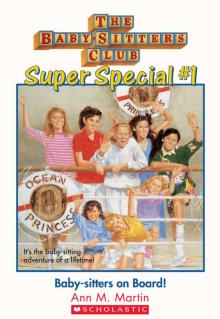 Baby-Sitters on Board!
Baby-Sitters on Board!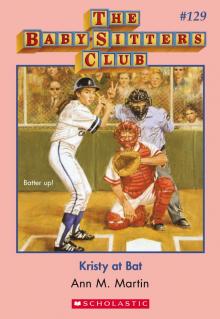 Kristy at Bat
Kristy at Bat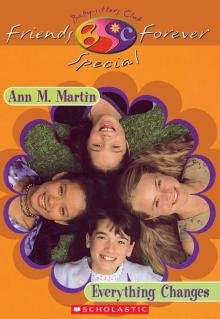 Everything Changes
Everything Changes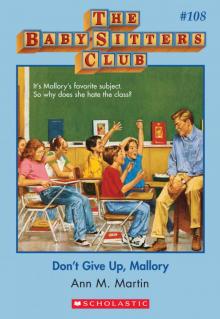 Don't Give Up, Mallory
Don't Give Up, Mallory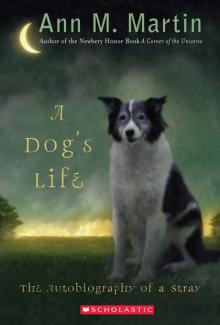 A Dog's Life: The Autobiography of a Stray
A Dog's Life: The Autobiography of a Stray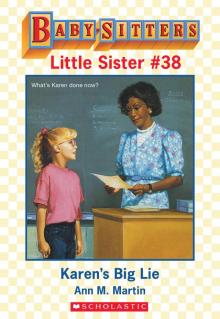 Karen's Big Lie
Karen's Big Lie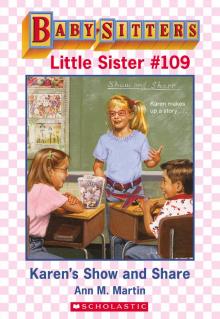 Karen's Show and Share
Karen's Show and Share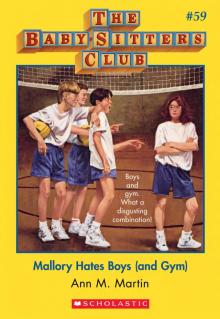 Mallory Hates Boys (and Gym)
Mallory Hates Boys (and Gym)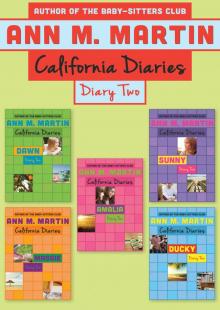 Diary Two: Dawn, Sunny, Maggie, Amalia, and Ducky
Diary Two: Dawn, Sunny, Maggie, Amalia, and Ducky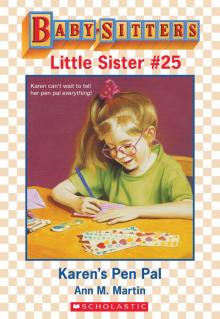 Karen's Pen Pal
Karen's Pen Pal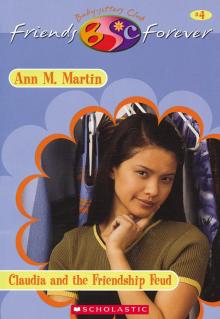 Claudia and the Friendship Feud
Claudia and the Friendship Feud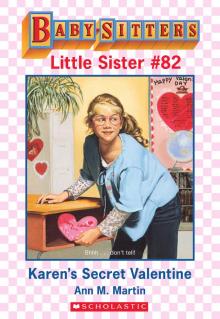 Karen's Secret Valentine
Karen's Secret Valentine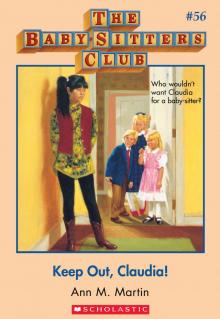 Keep Out, Claudia!
Keep Out, Claudia!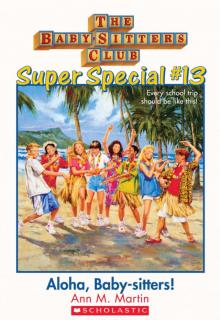 Aloha, Baby-Sitters!
Aloha, Baby-Sitters!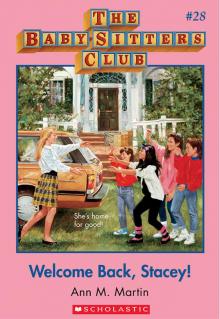 Welcome Back, Stacey
Welcome Back, Stacey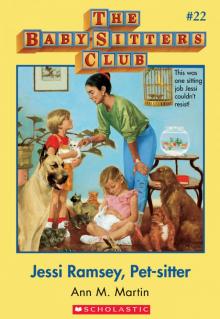 Jessi Ramsey, Pet-Sitter
Jessi Ramsey, Pet-Sitter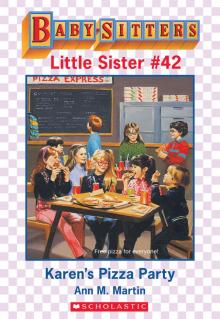 Karen's Pizza Party
Karen's Pizza Party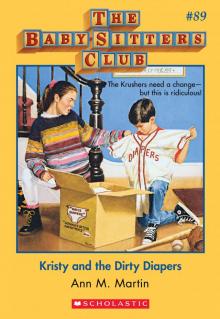 Kristy and the Dirty Diapers
Kristy and the Dirty Diapers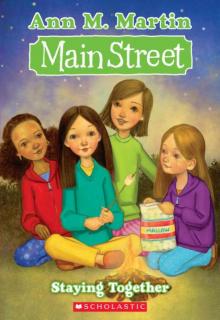 Staying Together
Staying Together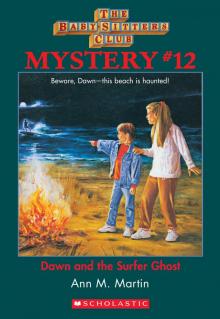 Dawn and the Surfer Ghost
Dawn and the Surfer Ghost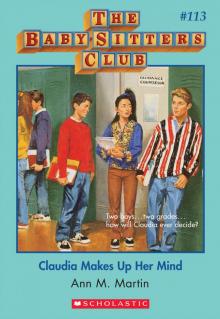 Claudia Makes Up Her Mind
Claudia Makes Up Her Mind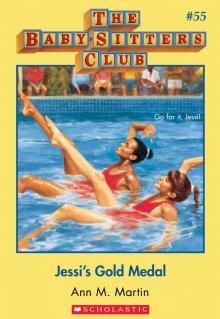 Jessi's Gold Medal
Jessi's Gold Medal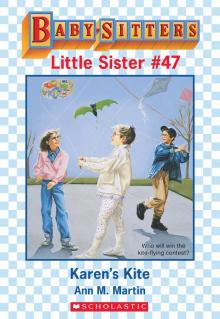 Karen's Kite
Karen's Kite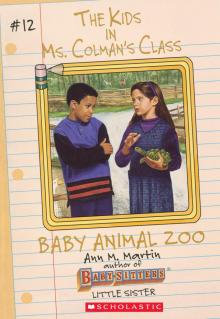 Baby Animal Zoo
Baby Animal Zoo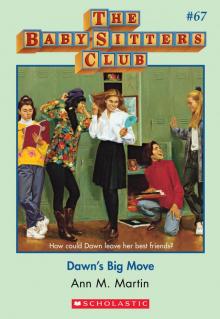 Dawn's Big Move
Dawn's Big Move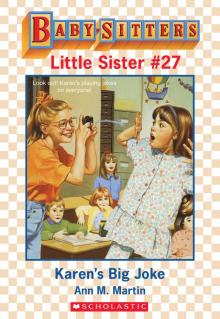 Karen's Big Joke
Karen's Big Joke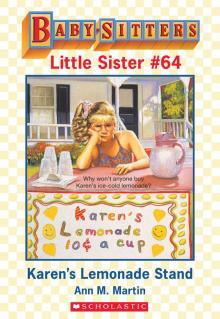 Karen's Lemonade Stand
Karen's Lemonade Stand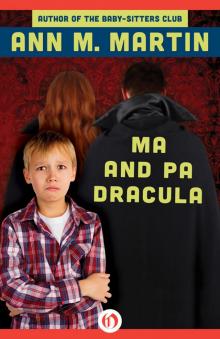 Ma and Pa Dracula
Ma and Pa Dracula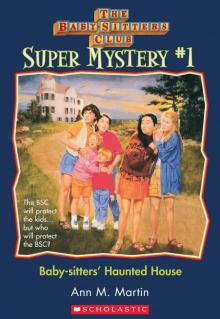 Baby-Sitters' Haunted House
Baby-Sitters' Haunted House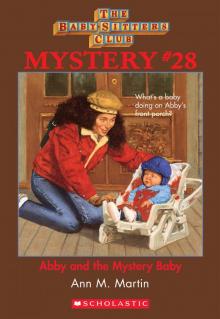 Abby and the Mystery Baby
Abby and the Mystery Baby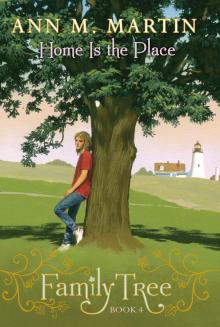 Home Is the Place
Home Is the Place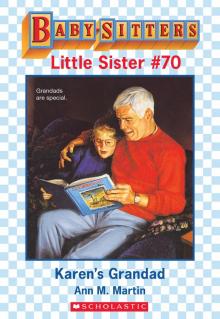 Karen's Grandad
Karen's Grandad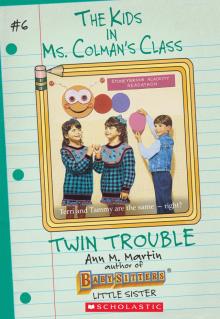 Twin Trouble
Twin Trouble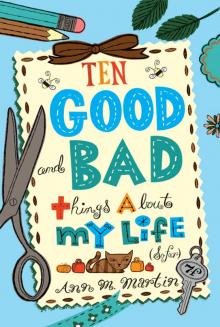 Ten Good and Bad Things About My Life (So Far)
Ten Good and Bad Things About My Life (So Far)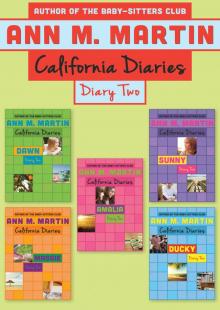 Diary Two
Diary Two Baby-Sitters Club 027
Baby-Sitters Club 027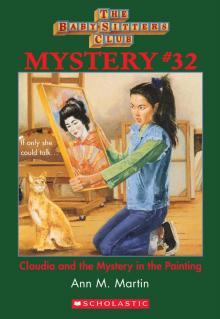 Claudia and the Mystery Painting
Claudia and the Mystery Painting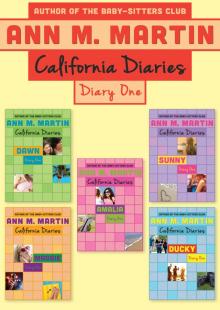 Diary One
Diary One Baby-Sitters Club 037
Baby-Sitters Club 037 Baby-Sitters Club 028
Baby-Sitters Club 028 Baby-Sitters Club 085
Baby-Sitters Club 085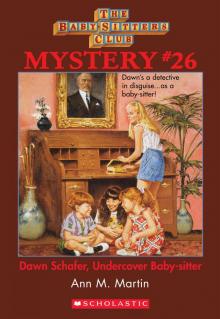 Dawn Schaffer Undercover Baby-Sitter
Dawn Schaffer Undercover Baby-Sitter Jessi's Babysitter
Jessi's Babysitter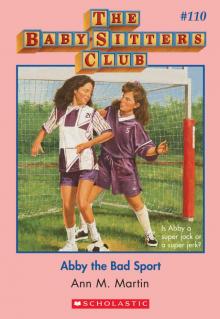 The Baby-Sitters Club #110: Abby the Bad Sport (Baby-Sitters Club, The)
The Baby-Sitters Club #110: Abby the Bad Sport (Baby-Sitters Club, The) Karen's Little Sister
Karen's Little Sister Baby-Sitters Club 058
Baby-Sitters Club 058 Claudia And The Genius On Elm St.
Claudia And The Genius On Elm St.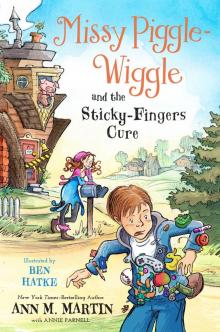 Missy Piggle-Wiggle and the Sticky-Fingers Cure
Missy Piggle-Wiggle and the Sticky-Fingers Cure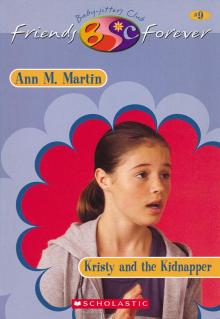 Kristy and Kidnapper
Kristy and Kidnapper Baby-Sitters Club 041
Baby-Sitters Club 041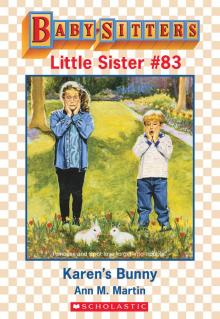 Karen's Bunny Trouble
Karen's Bunny Trouble Baby-Sitters Club 032
Baby-Sitters Club 032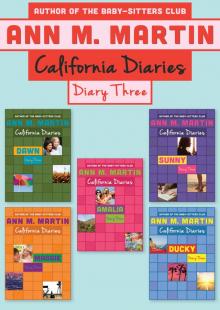 Diary Three
Diary Three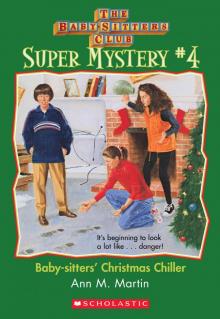 Christmas Chiller
Christmas Chiller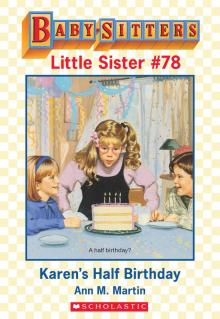 Karen's Half-Birthday
Karen's Half-Birthday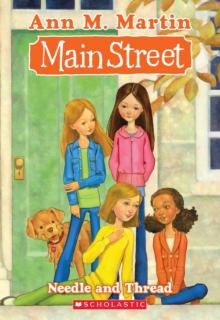 Needle and Thread
Needle and Thread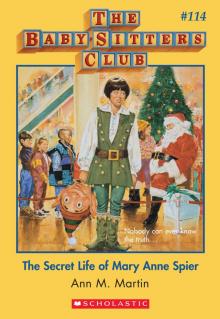 Secret Life of Mary Anne Spier
Secret Life of Mary Anne Spier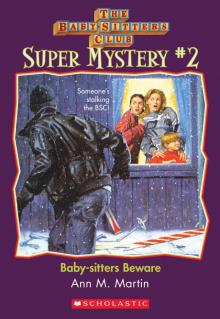 Baby-Sitters Beware
Baby-Sitters Beware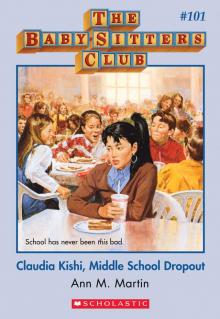 Claudia Kishi, Middle School Drop-Out
Claudia Kishi, Middle School Drop-Out Logan Likes Mary Anne !
Logan Likes Mary Anne ! Baby-Sitters Club 061
Baby-Sitters Club 061 Best Friends
Best Friends Baby-Sitters Club 031
Baby-Sitters Club 031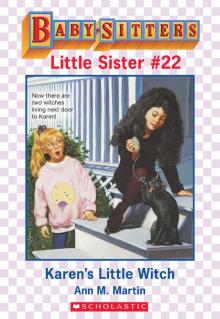 Karen's Little Witch
Karen's Little Witch Jessi Ramsey, Petsitter
Jessi Ramsey, Petsitter Baby-Sitters Club 123
Baby-Sitters Club 123 Baby-Sitters Club 059
Baby-Sitters Club 059 Baby-Sitters Club 033
Baby-Sitters Club 033 Baby-Sitters Club 060
Baby-Sitters Club 060 Baby-Sitters Club 094
Baby-Sitters Club 094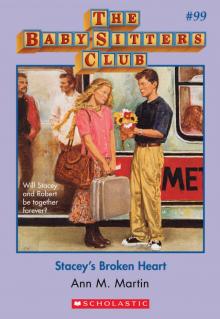 The Baby-Sitters Club #99: Stacey's Broken Heart
The Baby-Sitters Club #99: Stacey's Broken Heart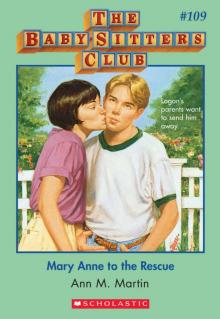 The Baby-Sitters Club #109: Mary Anne to the Rescue (Baby-Sitters Club, The)
The Baby-Sitters Club #109: Mary Anne to the Rescue (Baby-Sitters Club, The) Mystery At Claudia's House
Mystery At Claudia's House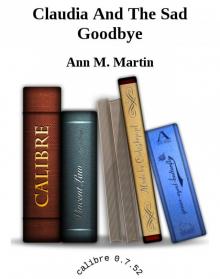 Claudia And The Sad Goodbye
Claudia And The Sad Goodbye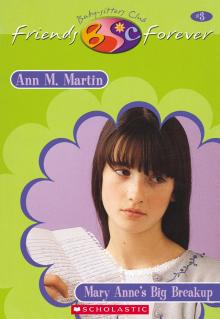 Mary Anne's Big Break-Up
Mary Anne's Big Break-Up Baby-Sitters Club 025
Baby-Sitters Club 025 Baby-Sitters Club 042
Baby-Sitters Club 042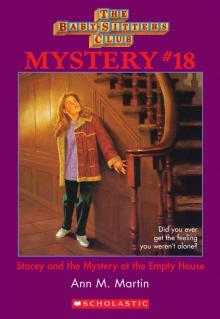 Stacey and the Mystery of the Empty House
Stacey and the Mystery of the Empty House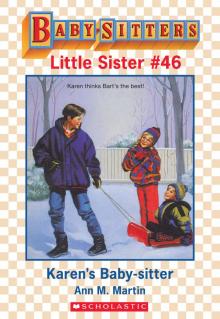 Karen's Baby-Sitter
Karen's Baby-Sitter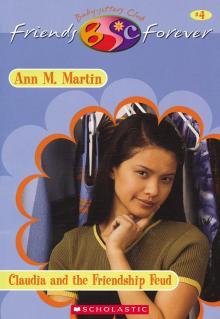 Claudia's Friendship Feud
Claudia's Friendship Feud Baby-Sitters Club 090
Baby-Sitters Club 090 Baby-Sitters Club 021
Baby-Sitters Club 021 Baby-Sitters Club 056
Baby-Sitters Club 056 Baby-Sitters Club 040
Baby-Sitters Club 040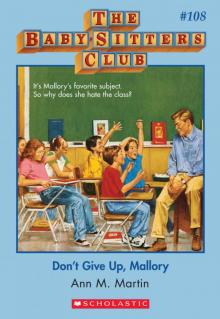 The Baby-Sitters Club #108: Don't Give Up, Mallory (Baby-Sitters Club, The)
The Baby-Sitters Club #108: Don't Give Up, Mallory (Baby-Sitters Club, The)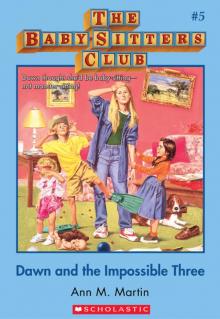 Dawn and the Impossible Three
Dawn and the Impossible Three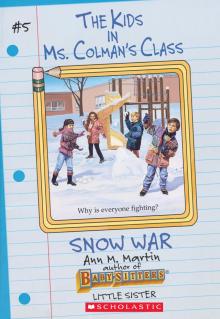 The Snow War
The Snow War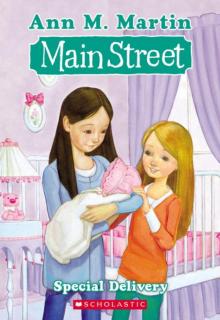 Special Delivery
Special Delivery Baby-Sitters Club 057
Baby-Sitters Club 057 Mary Anne And Too Many Babies
Mary Anne And Too Many Babies Baby-Sitters Club 030
Baby-Sitters Club 030